Being able to laugh at yourself and those around you under the most miserable of circumstances is half the battle. My literary favorites under similar circumstances have been Gottfried Keller, Bertolt Brecht, Heinrich Heine, Victor Hugo, Mark Twain, and Rainer Maria Rilke. Unfortunately, I will have no time to read them now.
Table of Contents
- Introduction
- A Year of Contradictory Extremes
- Fall from Grace
- My 9/11 Departure
- A Rabid Cat Near the Panama
- A Carefully Kept Vow
- Peter Baron, an Anonymous Nun, and Solanus Casey
- The Mission
- Happy 67th!
- The Chapel
- The Bitter, Sweet, and Sour of a Non-Organic Diet
- Mold in the Bread of Life
- Male Bravado and Private Space
- L'éléphant
- Early Morning Wake-Up Call
- An Awkward, but Reasonable Strategy Forward
- Amin Al Baladi
- Hooray! Hing Hay!
- My New Municipal Work Environment
- A Footnote for My Homeless Readership
- Liberal Dialogue
- Gender at Hing Hay
- Race Relations at the Mission
- American Age Discrimination
- Government Bureaucracy and the Power of Imaginative Reality
- Elements of Transition
- The YMCA
- My Physical Well-Being
- Beyond Misinformation and the Corner Café
- Dong-Guk Nabi
- Porfirio Andara
- Family and Friends
- Family Closure
- To Be, or Not to Be? Don't Tell Your Friends
- Liberty - A Philosophy of Permanence
- Procesos de Mercado
- Hillsdale College
- Grammar Captive
- Looking Forward
- January 4th in the Year 2017
A Year of Contradictory Extremes,
Abrupt Change, and Hope Sustained
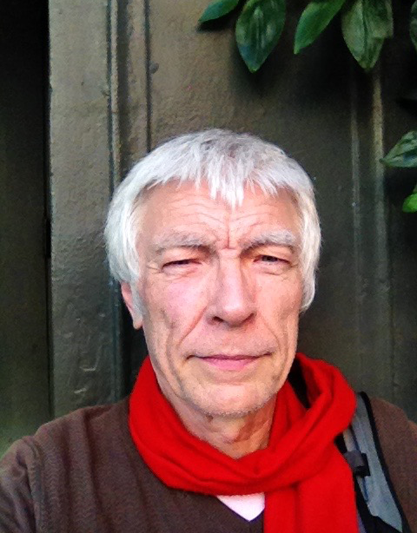 As I was plummeting from aspiring online developer and business owner to homeless vagrant, my friend’s were encouraging me to prepare for a life of humble Christian simplicity. I make no apology for what follows, for indeed, never has my life been so complicated, challenging, and miserable. And, never have I been so defiant, determined, and tolerant. I will do my best to be funny, but please do not raise your expectations beyond the generous charity that I have received from the Seattle Christian community and my former Saudi students.
As I was plummeting from aspiring online developer and business owner to homeless vagrant, my friend’s were encouraging me to prepare for a life of humble Christian simplicity. I make no apology for what follows, for indeed, never has my life been so complicated, challenging, and miserable. And, never have I been so defiant, determined, and tolerant. I will do my best to be funny, but please do not raise your expectations beyond the generous charity that I have received from the Seattle Christian community and my former Saudi students.
For nearly a year and a half I had occupied a newly furnished studio apartment that served as my office and residence. There, with the exception of my morning coffee at the Corner Café and my daily work-outs at the 24-Hour Fitness gym — a much longer walk to the bottom of First Hill and back — I spent nearly the entirety of everyday in quiet solitude busily at work on my computer. All of this suddenly changed on August 30, 2016 when I was denied reasonable allowance by the King County Superior Court, my already 20-day long hunger strike was brutally interrupted, and I became homeless 11 days after.
Within a period of three weeks I went from a life of highly productive solitude atop First Hill to nearly inescapable communal living at the Bread of Life Mission at 1st Avenue and Main Street in Pioneer Square, Hing Hay Coworks on South Maynard Avenue in Seattle's International District, and the downtown YMCA on 4th Avenue between (James) Madison and (Francis) Marion Avenues.
What precipitated my hunger strike and my thoroughly just, but untimely eviction is well documented at www.nudge.online. This year's annual report will be largely confined to what occurred after September 11th.
Fall from Grace
My 9/11 Departure
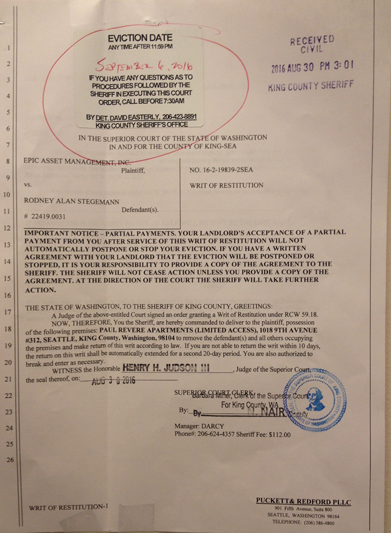 Although the date of my eviction was set for Wednesday, September 7, my building manager, Darcy Eakins, arranged with the King County Sheriff that I would not have to vacate until Monday, September 12th. As I was still recovering from my weakened condition, I was very thankful for her cooperation.
Although the date of my eviction was set for Wednesday, September 7, my building manager, Darcy Eakins, arranged with the King County Sheriff that I would not have to vacate until Monday, September 12th. As I was still recovering from my weakened condition, I was very thankful for her cooperation.
I left my apartment on Sunday, September 11, in commemoration of America’s persistent failure to discover and prosecute those who perpetrated the destruction of the World Trade Center — including the controlled demolition of Buildings No. 1, 2, and 7.
Loading my belongings into a truck that I rented from ZipCar with the financial help of my good friend, David Evans, and his wife, Sandra, took much longer than I expected — this, despite the generous help of my good friend, Eduardo Cordova, a server at the Corner Café, who also rode with me to Federal Way to stow my belongings before returning to Seattle. The unexpected length of the move made it impossible for me to make the trek to Tiger Mountain that afternoon where I intended to exercise my freedom of last resort and spend my last moment in the serenity of a colorful sunset.
A Rabid Cat Near the Panama
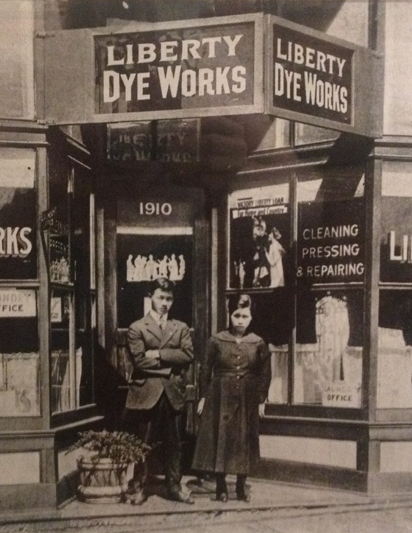 I spent the night at the Panama Hotel only to discover on the following morning that there was not enough money left on my newly issued CapitalOne credit card to pay the bill. Already I was beginning to feel the long term consequences of what surely lie ahead. So, I spent much of the morning in elaboration of a poem (see "Along the Path to Empire" at www.nudge.online) that I had begun on the previous evening in an effort to maintain my emotional stability and sanity. I wrote until my imaginative drive was exhausted, gathered together the contents of my death pack, and proceeded to the front desk. Fortunately, no one was present. Rather than ringing the bell, I left a note in the guest register, skipped the morning breakfast that came with the room, and walked up First Hill to the Corner Café.
I spent the night at the Panama Hotel only to discover on the following morning that there was not enough money left on my newly issued CapitalOne credit card to pay the bill. Already I was beginning to feel the long term consequences of what surely lie ahead. So, I spent much of the morning in elaboration of a poem (see "Along the Path to Empire" at www.nudge.online) that I had begun on the previous evening in an effort to maintain my emotional stability and sanity. I wrote until my imaginative drive was exhausted, gathered together the contents of my death pack, and proceeded to the front desk. Fortunately, no one was present. Rather than ringing the bell, I left a note in the guest register, skipped the morning breakfast that came with the room, and walked up First Hill to the Corner Café.
Several weeks before my eviction, I had asked the hotel's manager to allow me to live at the hotel in exchange for the creation of a mobile application that would promote the hotel and neighboring coffee shop. She declined my offer. On the evening of my eviction from Paul Revere Apartments I asked for permission to stay at the hotel at the same discounted weekly rate that she had permitted when I first returned to Seattle nearly a year and a half before. She demurred in this regard as well and charged me a full night’s rent. Whereupon she showed me her badly swollen wrist that had been bitten earlier in the day by a rabid cat. It were as if I were being punished for her own misfortune. My note in the guest register on the following day indicated that I was on my way to Tiger Mountain and would likely not return.
In the end my credit card was charged for the room, but the payment was never made: CapitolOne could not confirm that I was the resident to be charged. I was very pleased with my good fortune, as I had been able to use what little remained on the card to make other badly needed purchases.
As it was never my objective to cheat the hotel, I did not hesitate several weeks later to translate into English the name of a Japanese bath located in the same national heritage building as the hotel. It took me a full 40 minutes to research a proper translation, and I was thankful for the opportunity to provide compensation for my failure to have made payment.
As the hotel is only two blocks away from the Hing Hay Coworks, where I was finally able to find office space to continue my online development, I could not help but wonder whether my having been asked by a fellow office mate at the Coworks to make the translation was not something more than mere coincidence. To this day I have not returned to the hotel, but did step in once at the café to pay for a coffee, make use of the internet, and say hello to the barista.
A Carefully Kept Vow
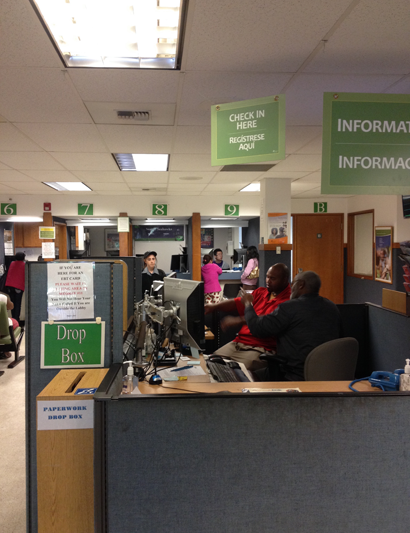 At the Corner Café Eduardo treated me to breakfast whereupon I gave him my wallet and the keys to my storage locker. Although he took both, he told me that I should not yet surrender, as he knew of someone that might be able to help in finding me a new residence at a price that I could afford. With just over USD 700 in government income and the promise of an additional USD 200 in EBT food stamps I was very skeptical. Still, I paid a visit to the state welfare office to obtain the aforementioned stamps (EBT Card) and waited. Upon my return to the café I was told that I should wait just a little longer until the following day.
At the Corner Café Eduardo treated me to breakfast whereupon I gave him my wallet and the keys to my storage locker. Although he took both, he told me that I should not yet surrender, as he knew of someone that might be able to help in finding me a new residence at a price that I could afford. With just over USD 700 in government income and the promise of an additional USD 200 in EBT food stamps I was very skeptical. Still, I paid a visit to the state welfare office to obtain the aforementioned stamps (EBT Card) and waited. Upon my return to the café I was told that I should wait just a little longer until the following day.
So as not to disappoint the very same who had helped me salvage my belongings, I decided to wait. If anyone could prevent me from my now long desired fate atop Tiger Mountain, it would be Eduardo. For, Eduardo understood my current situation better than anyone whom I knew. Unfortunately, he had been poorly informed about the potential for new lodging, and little came of the following day’s interview that could not be summarized as an outpouring of sympathy and a long list of little desired, government agencies.
I spent the rest of the afternoon working on my poem, and in the evening called my good friend Sadykh Sadykhov. Like everyone else before him that day, he encouraged me not to end my life. During our conversation we discussed various strategies, each other’s past, and little ways in which he could help me in fulfilling the strategy that he ultimately recommended. I listened patiently and thanked him for his help and encouragement. Unfortunately, I still could not see my way out of my dilemma even with the strategy and sacrifices that he recommended.
That night I had no place to lay my head, and I was not about to become the very same whom I told myself time and time again I would never become — a homeless vagrant on the streets of American empire. I had not asked Sadykh for a place to stay that night, and he did not offer. In fact, no mention was ever made about where I would spend the night. My sights were on the long term. My short term solution was my death pack and Tiger Mountain. So, I wandered from one bistro and coffee shop to the next in search of a place to spend the night and evening in anticipation of the morrow’s trek to the mountain.
In the end I spent the night seated half awake in the International House of Pancakes just across the street from an entrance to Seattle University. The irony of location was simply compelling. In the end, it was the only location in the neighborhood that remained open.
Peter Baron, an Anonymous Nun, and Solanus Casey
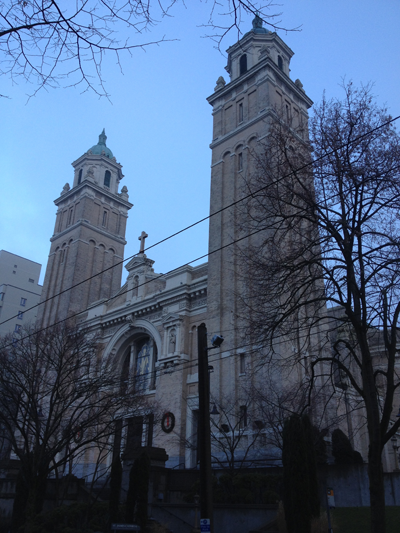 On the following day while on my way to Tiger Mountain I passed the St. James Cathedral and thought of Dr. Baron, my long standing German friend in Tōkyō, for whom I had once translated into English his German guide to Tōkyō’s Catholic churches entitled Begegnungen besonderer Art: Verborgene Orte der Anbetung in Tōkyō. I stopped and entered the cathedral.
On the following day while on my way to Tiger Mountain I passed the St. James Cathedral and thought of Dr. Baron, my long standing German friend in Tōkyō, for whom I had once translated into English his German guide to Tōkyō’s Catholic churches entitled Begegnungen besonderer Art: Verborgene Orte der Anbetung in Tōkyō. I stopped and entered the cathedral.
I felt nothing as I stood before the Virgin Mary that my friend so often recommended. I then paused to examine the church’s interior, but once again my mind drew a blank. Whereupon I heard what appeared to be a prayer meeting in a neighboring room. Rather than remain in the Cathedral, where I felt very much out of place, I waited outside until the meeting was over.
Seeing people leaving the building I reentered and sought out the minister who had conducted the prayer. He had already departed. Very conscious of my now ragged condition I was hesitant to approach anyone else and simply sat down and waited. Two security guards passed, but said nothing. In time, a covered nun appeared and entered a small chapel next to the altar area where the statue of the Virgin Mary stood. When she finished her prayer I asked her, if I could not speak with her. She sat down next to me, and we chatted. She had come to pray in preparation for an interview for employment in the Cathedral’s kitchen. There she would provide food for homeless people such as myself.
Although I had already begun to feel somewhat destitute, I was not yet desperate and hardly considered myself to be homeless in the same sense that she interpreted the word. Simply I was tired and my cherished freedom of last resort brought me profound comfort.
She was a young woman and spoke English well. She stated that she was Vietnamese, and I was reminded of my former Vietnamese friends at Michigan State University who had left their homeland when the United States abandoned Saigon (Ho Chi Minh City) in March of 1973. They were the ones who taught me the saying, "Partir, c'est mourir un peu, mais vivre beaucoup", as I was preparing to leave for Europe the second time.
She escorted me to the Cathedral’s main office where I was told about the Solanus Casey Center, an adjunct administrative office of the Seattle Archdiocese. It was there where I met Jon Prosiv.
After some discussion I convinced Jon that my life was worthy of the Center’s investment, whereupon he wrote a check for USD 25 on my behalf and told me to deliver it to the Bread of Life Mission at the bottom of First Hill. Unfortunately, the check was refused by the Mission’s Program Director, because the year on the check was wrongly indicated. Had I only received employment in 2015 when I saw the disaster coming, I would have had no need to be asking for help at the Center in 2016. Truly, Jon had understood. Perhaps, too well.
As first-comers are allowed to stay free of charge for the first two nights, and as the misdated check served as a reference from a known entity, I was nevertheless allowed to stay. On the following morning, I walked back up the hill, and later in the afternoon Jon corrected the error. When I returned to the Mission that evening the check was refused for a second time. This time I was accused of forgery, but allowed to stay with the warning that a third night would not be possible, if I did not find another form of payment. So, I returned to the Center still again, and a suitable payment method was eventually found. By the time the five additional days were exhausted my social security payment of USD 403.00 had been deposited, and I was able to pay my own way.
The Mission
Living as a homeless person in my own homeland is quite appropriate, for nearly everywhere I go, I am told that I have an accent and asked from where I come. Important is that I am making no attempt to change my accent, for the simple reason that I have no desire to become too close to a land that has willfully abandoned its most precious gift — the spirit and principles of liberty upon which our nation was founded.
Happy 67th!
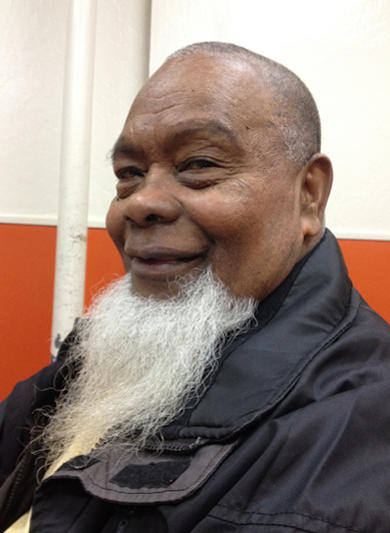 December 13, my birthday, marked the end of my uninterrupted third month at the Mission. One of my dormmates gave me two egg rolls that he had purchased somewhere in the International District's Chinatown earlier in the day. As food is not permitted in the dorm room I placed them in my locker downstairs. On the following morning I took them to Hing Hay, placed them in the office refrigerator, and ate them unheated for lunch -- a fitting birthday celebration for my new living and work accommodations in American society.
December 13, my birthday, marked the end of my uninterrupted third month at the Mission. One of my dormmates gave me two egg rolls that he had purchased somewhere in the International District's Chinatown earlier in the day. As food is not permitted in the dorm room I placed them in my locker downstairs. On the following morning I took them to Hing Hay, placed them in the office refrigerator, and ate them unheated for lunch -- a fitting birthday celebration for my new living and work accommodations in American society.
I told no one at Hing Hay that it was my birthday.
My dormmates are a motley group of individuals ranging from physically reformed alcoholics with often unreformed alcoholic personalities to hard core drug dealers who are fortunately far fewer in number. Between these extremes are street custodians, street vendors, construction workers, and other manual laborers — some daily, some full-time, and some in between — who take advantage of the Mission’s generosity to cut costs and save a larger portion of their meagre, sometimes substantial incomes for whatever purpose. Others of my dormmates include welfare vagrants, petty thieves, petty vandals, displaced persons, and the like. What the majority share in common is vulgar language. Several suffer from a severe personality disorder of one sort or another, and a great many of them smoke cigarettes, weed or both. There are also those who regularly appear at the Mission drunk on arrival. Noxious odors are common in the Mission, and I would not be surprised, if everyone at the Mission has not spent at least some time in jail. If asked to guess the average age, then it would be something between 35 and 42. Some have been at the Mission for many years. Others have spoken of having spent more than a decade as a homeless person and are eager to recount their exploits. To their dismay at times I am not so eager to hear them.
Surely, the majority, if not all, in the Mission have spent at least some time sleeping along a city street, under a highway viaduct, in an abandoned building, or on some commercial building’s doorstep.
Most at the Mission have a need or desire for inexpensive shelter and two free meals a day (breakfast from 6:00 to 6:30 AM and dinner from 7:00 to 7:30 PM). Required of us all is a shower, respect for the Mission and each other, and conformity to the rules. The first requirement is, thankfully, fairly well enforced. Achieving the second is both a collective and individual effort, as individual respect is not something that is easily achieved when you live only one rung from the bottom of society and daily survival is your only goal in life. Achieving the third requirement depends pretty much on who is on duty, what part of the management team is present, and who within the collective is offended by the rule being broken at the moment that it is broken. No, the Mission is not a prison, but someone higher up on the staff’s hierarchy once told me how to stay out of trouble and gave his own experience as a former prison inmate as an authoritative credential.
Probably the most difficult part of my life at the Mission is the enormous amount of wasted time, for the people who dwell there are a restless lot, and focusing on anything that is itself not moving is a daunting task. This makes reading, writing, and thinking that is not in the form of externalized conversation extremely difficult.
The Chapel
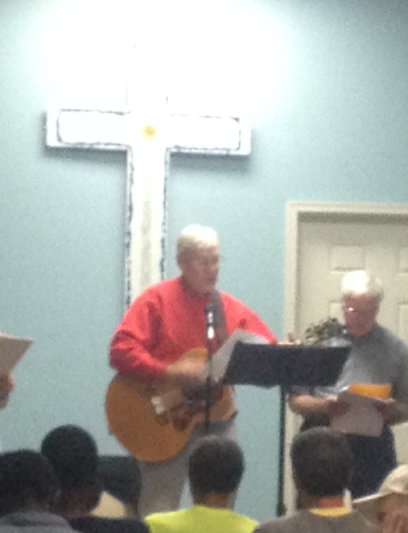 The “chapel” is a large, rectangular, all-purpose, waiting room that, when filled to capacity, seats about 50 people. The walls are plain and drab. At one end of the room hangs a very large, three-dimensional cross that serves as background for a slightly elevated stage that all residents and visitors, except those who preach and perform, are prohibited from occupying. At the other end of the room is a wall clock — far to small for the empty wall on which it hangs — to which I often look in anticipation of an early conclusion to still another sermon of misery, deprivation, failed imagination, and for some, hope.
The “chapel” is a large, rectangular, all-purpose, waiting room that, when filled to capacity, seats about 50 people. The walls are plain and drab. At one end of the room hangs a very large, three-dimensional cross that serves as background for a slightly elevated stage that all residents and visitors, except those who preach and perform, are prohibited from occupying. At the other end of the room is a wall clock — far to small for the empty wall on which it hangs — to which I often look in anticipation of an early conclusion to still another sermon of misery, deprivation, failed imagination, and for some, hope.
On the adjacent walls between the clock and the cross are opposed a wide-screen television set and a window to the Mission’s front office. On the wide screen is nearly always some sort of sports event that is either muted or simply disappears during a sermon, prayer, or special announcement. The window on the opposite wall is a large, elevated, sliding glass opening that enables the office’s occupants direct access to the chapel without having to leave their office on the other side of the wall. The front office is regularly manned by one of two people both of whom bear the same first name. Although somewhat similar in size, they are very different in appearance. Both are overweight. More importantly, their personalities are exactly opposed; where the one is congenial and nearly always helpful, the other smiles little and is inexorably authoritarian. Of this latter, compassion and understanding are sometimes observed, but his enforcement of the rules are too often excessive and/or arbitrary to the point of being malicious.
The path to the dining room behind the stage is a narrow corridor that passes along side the stage. The speed at which the line before the door to the corridor forms after each prayer is surely an indication of the need for food, escape from prayer, or both. There are those who remain seated after prayer, but unlikely in awe of what they just heard. For even the loud cracking of one plastic chair being stacked atop the other before each stack is pushed to the wall under the clock is not sufficient cause for their arousal. One can only wonder how they probably past their day.
The warmth of the food when it is finally served depends on the length of the sermon and prayer: long prayer meetings usually mean cold food, and shorter prayer meetings hot. As it is merely a positive correlation, the warmth of our meals, or absence thereof, cannot always be explained.
 Just before dinner we are a captured audience whose only alternatives are to attend the sermon, find a meal elsewhere, or stand queue outside the Mission while inhaling second-hand smoke filled with nicotine, THC, or both and waiting for the sermon to end. The goal of the chapel is, of course, Christian conversion and reform. To this end we are told how bad we are and threatened with eternal damnation, if we do not repent and accept, as divine, the words of those standing before us. In effect, we are treated like mules who, after being beaten on the ass to instill pain and fear, are then pulled by the nose to an oasis of spiritual fulfillment. The decision to drink from the oasis, we are told, is, of course, ours and ours alone. It is the magic formula of Christian evangelism: extortion and seduction, blame, free-will, and salvation. Some of the speakers are very persuasive. Others are outright offensive. All claim to be messengers of the Lord God, as if, indeed, we needed still another lord to find our way.
Just before dinner we are a captured audience whose only alternatives are to attend the sermon, find a meal elsewhere, or stand queue outside the Mission while inhaling second-hand smoke filled with nicotine, THC, or both and waiting for the sermon to end. The goal of the chapel is, of course, Christian conversion and reform. To this end we are told how bad we are and threatened with eternal damnation, if we do not repent and accept, as divine, the words of those standing before us. In effect, we are treated like mules who, after being beaten on the ass to instill pain and fear, are then pulled by the nose to an oasis of spiritual fulfillment. The decision to drink from the oasis, we are told, is, of course, ours and ours alone. It is the magic formula of Christian evangelism: extortion and seduction, blame, free-will, and salvation. Some of the speakers are very persuasive. Others are outright offensive. All claim to be messengers of the Lord God, as if, indeed, we needed still another lord to find our way.
Except for occasional talent in the form of musical accomplishment or rhetorical mastery the services are a testimony to collective ignorance and despair. Please do not misunderstand, for there is a good side to all of this: the tool of moral suasion that is placed in all of our hands when we ascend to the dormroom. In this regard Michael Lloyd, the house manager, is the shining star of the Mission, and his absence would be truly missed. He is a devout Christian and reminds us daily that we reside in a Christian mission and should behave accordingly. Although his words appear to be quickly forgotten, they are easily resurrected and enforced as the need arises.
The daily chapel audience can be roughly divided into three subgroups seated as one before the stage and wide-screen TV. The direction of seating depends on whether the TV is turned off or on. Firstly, there are those who pay the USD 5 daily fee for food, a required shower, and their own bunk on the third floor; secondly, those who pay nothing, receive the same food, but pass the night downstairs on mattresses laid out on the floor in the all-purpose room after each prayer; and thirdly, those who simply come to eat and then leave probably to spend their night somewhere on the threshold of a private commercial enterprise, in the entry way of a large commercial building, along a nearby sidewalk, or under a highway viaduct.
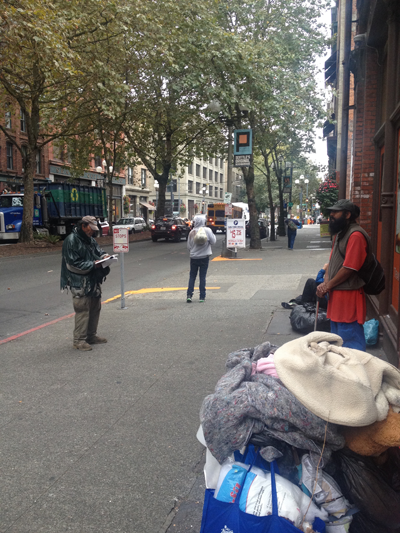 Anywhere from a third to a half of the audience regularly listens to the speaker with their eyes open. Musical performers — depending on the level of their developed or underdeveloped talent — and rhetorical masters obtain a better hearing. The others listen with indifference, do not listen at all, or makes jokes and cast dispersions. Those who are especially vocal in their antagonism toward the speaker or performer are eventually thrown out. It is any wonder that these latter come in the first place — not even the lure of free food and shelter can silence their confrontational “right of free speech” on a private premises open to the public.
Anywhere from a third to a half of the audience regularly listens to the speaker with their eyes open. Musical performers — depending on the level of their developed or underdeveloped talent — and rhetorical masters obtain a better hearing. The others listen with indifference, do not listen at all, or makes jokes and cast dispersions. Those who are especially vocal in their antagonism toward the speaker or performer are eventually thrown out. It is any wonder that these latter come in the first place — not even the lure of free food and shelter can silence their confrontational “right of free speech” on a private premises open to the public.
Fortunately, no one objects to our use of smart phones during the services; we have only to employ them silently so that the “messages of eternal damnation and salvation” can be made readily available for those who wish to hear them. In the end, so long as I remain in this life and at the shelter, I am grateful that I have a roof over my head and food in my stomach, and that those around me are compelled to shower before they go to bed. Simply, I do not know how much more well-intended generosity I will be willing to take. My success or failure with Grammar Captive will likely be determinant.
The baggage that some bring into the Mission in anticipation of their “free” evening meal is often infested with bed bugs and other insects that can be easily passed from one person’s clothing to another’s and eventually into one’s own bunk. For this reason I am happy that I have been able to obtain a top bunk. Lower bunks attract unwanted squatters with clothing and other belongings that carry unwanted pests. Many residents actually prefer the lower bunks because the upper bunks are difficult to reach. In this regard I am slightly better off than many who occupy an upper bunk. Whereas most have to climb over the top rail at the end of their bunk to reach their top tier, I have direct access to my mattress via the back rail of an adjacent bunk that stands perpendicular to my own.
It is up to each of us to make the best use of his own situation and/or perspective.
The Bitter, Sweet, and Sour of a Non-Organic Diet
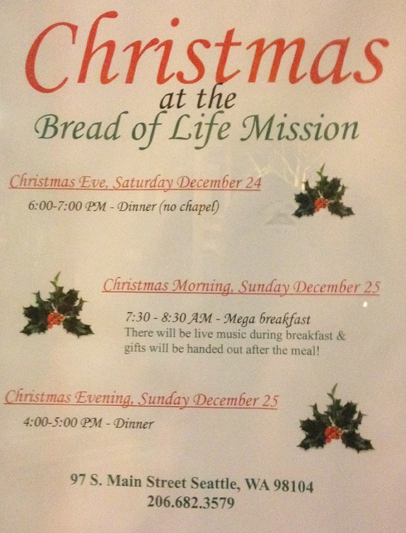 The meals are of varying poor quality with rare moments of imported luxury or even a masterful hand of someone on duty. As what we eat depends largely on what the Mission is given we tend to eat in bouts: the same batch of corn for a month, the same unsold catch of fish or frozen box of fish sticks for three days, the same vegetable for a week, etc. A favorite at the Mission is ice cream that like many of the other foods tends to appear in abundance or not at all.
The meals are of varying poor quality with rare moments of imported luxury or even a masterful hand of someone on duty. As what we eat depends largely on what the Mission is given we tend to eat in bouts: the same batch of corn for a month, the same unsold catch of fish or frozen box of fish sticks for three days, the same vegetable for a week, etc. A favorite at the Mission is ice cream that like many of the other foods tends to appear in abundance or not at all.
Certainly what I eat at the Mission is a far cry from my self-prepared organic diet that I heartily enjoyed before my reception at the Mission. Where before I ate almost nothing made from grain and raw sugar, I now have a daily intake. The vague feeling of soreness in my joints that I had thoroughly rid myself when I stopped eating grain foods has returned — this, despite my daily workouts and well-maintained circulatory system.
Where before I ate breakfasts filled with protein and evening meals replete with a variety of carbohydrates, now I am eating breakfasts with little or no protein, and evening meals whose protein content is simply deficient for my own body’s needs. Where before I depended on my food content for my daily nutrients I now take multivitamin and -mineral supplements and eat food primarily for energy. My EBT card is good for about half a month’s worth of salmon sushi and saba purchased at the expensive Uwajima Store (Uwajimaya) in the International District. Oatmeal, a food that I have never purchased and rarely ever ate, is served nearly every morning. I have yet to miss a serving, for the simple reason that I am well aware of the food’s nutritional and digestive value.
The use of food as a tool of manipulative suasion for Christian conversion is also used in the kitchen as a tool for staff recruitment. For, the food that we, the residents, eat is distinctly different from the food that the Mission's staff eats. This difference is especially evident early in the morning at the food counter in the kitchen. While at the counter are served oatmeal, unboxed cereal, overbaked pastry, and chocolate-filled rice crispy bars, on the tables behind the counter are being prepared a protein-rich diet of bacon and eggs.
 When it comes to festive meals such as those served on Thanksgiving Day, Christmas Eve, and Christmas Day, we, the paying residents, are treated the same as non-paying residents in the name of equality. On Thanksgiving and Christmas day we were forced to awake earlier than normal and then told to return two or three hours later and stand in line outside with non-paying guests for our breakfast. On the following day, no meals were served at all, as the staff required time to recover from the previous day's extraordinary preparation supplemented on both occasions by volunteers from the outside.
When it comes to festive meals such as those served on Thanksgiving Day, Christmas Eve, and Christmas Day, we, the paying residents, are treated the same as non-paying residents in the name of equality. On Thanksgiving and Christmas day we were forced to awake earlier than normal and then told to return two or three hours later and stand in line outside with non-paying guests for our breakfast. On the following day, no meals were served at all, as the staff required time to recover from the previous day's extraordinary preparation supplemented on both occasions by volunteers from the outside.
There is an important lesson in human nature and American society to be learned here. I will leave it to your own imagination to unravel the blatant double standards.
On the bright side, the coffee at the Mission is bitter and robust. The coffee purchased by the Coworks tends to be sour. Several members at the CoWorks purchase their coffee at a nearby Starbucks on the edge of Chinatown in protest. I, on the other hand, am happy to have something warm and stimulating in my stomach and prepare sour coffee for everyone, every morning, in gratitude. My several requests for Mountain Mist mineral water at the CoWorks has gone unheeded, and some of my colleagues even use, floride-laced, Seattle tap water, rather than the filtered refrigerator water, to replenish the coffee pot later in the day.
Mold in the Bread of Life
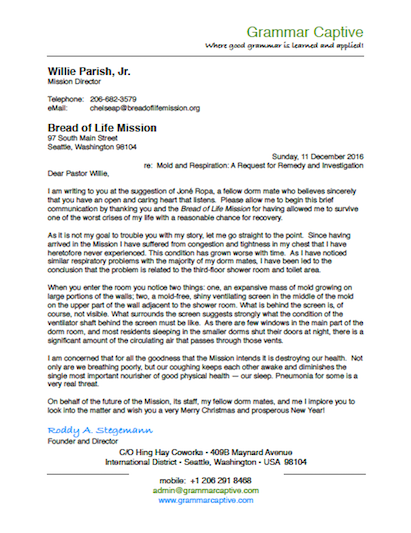 My greatest physical misgiving in my new lodging is the shower room and toilet area. In some places the walls are so infested with mold that they are actually black in color. Worse are the ventilating shafts that service these areas and help circulate the air in the adjoining sleeping areas. Indeed, what is growing on the walls is surely growing on the inner lining of most or all of our lungs. The last time that I had such a difficult time breathing was in my father’s house as a teen, and the difficulty that I am having in the Mission appears to be increasing with time. In my fathers house mold was not an issue; simply my father was an addicted smoker. It was at a time before the proven dangers of second-hand smoke were well understood.
My greatest physical misgiving in my new lodging is the shower room and toilet area. In some places the walls are so infested with mold that they are actually black in color. Worse are the ventilating shafts that service these areas and help circulate the air in the adjoining sleeping areas. Indeed, what is growing on the walls is surely growing on the inner lining of most or all of our lungs. The last time that I had such a difficult time breathing was in my father’s house as a teen, and the difficulty that I am having in the Mission appears to be increasing with time. In my fathers house mold was not an issue; simply my father was an addicted smoker. It was at a time before the proven dangers of second-hand smoke were well understood.
Mold is surely not the only cause of respiratory obstruction in the dorm, but the chronic coughing that I hear does not appear to be related to smoking, as smokers and non-smokers alike are affected. I can only hope that my recent letter to the Mission’s director has the intended result — a serious effort to make the Mission a mold-free residence.
Similar efforts have been made to rid the Mission of bed bugs and appear to be somewhat effective. I know this, for the question, “Who is currently suffering from bed bug bites?”, was once asked among a large number of residents. Few hands were raised, and I do not recall any being raised by those who dwell in the neighborhood of my third-floor bunk. It took me several weeks to learn how to defend myself against the presence of these and other bugs. The interim was very painful. (See "Fools of Consent" at www.nudge.online -- my second of two poems written during the first week of my official homeless status.)
Already a portion of the fungus has been removed with bleach and water. The person assigned to the task noted that the remaining fungus did not respond to his bleaching effort. When asked when the rest of the fungus would be removed, he responded that he did not know. In any case there was a noticeable temporary reduction in coughing after the bleaching, and the entire house has been made mold-aware. My own breathing has also improved somewhat.
Male Bravado and Private Space
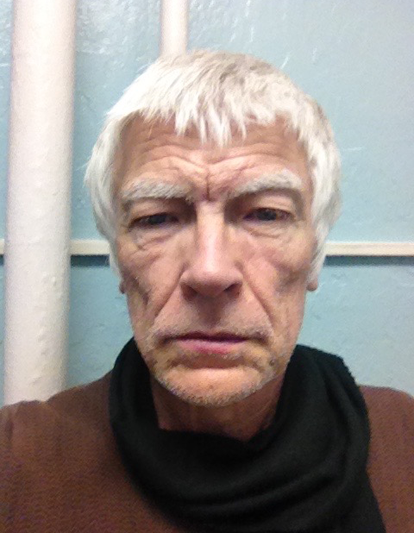 Although I am used to the bravado that one sometimes encounters at a gym, I am not used to the frequency with which it occurs at the Mission. The close quarters to which we are confined from as early as 5:15 PM at night until 6:30 AM on the following morning surely contribute to this kind of behavior.
Although I am used to the bravado that one sometimes encounters at a gym, I am not used to the frequency with which it occurs at the Mission. The close quarters to which we are confined from as early as 5:15 PM at night until 6:30 AM on the following morning surely contribute to this kind of behavior.
In the gym it is easy to walk away, find another station, and return to the same at a later time. In the dorm all you can really do is occupy another crowded space in an aisle between bunks or in front of the shower room and toilet area. Alternatively, you can find someone friendly with whom to speak and share their own private space while you wait for the bravado to disappear from yours. Your own bunk is hardly a sanctuary. as it takes only one person’s confused monologue or two others’ intense and/or relentless dialogue to remind you that you are not the master of what you hear, only that to what you listen. A similar observation can be made in regard to body and clothing odor, and the many sprays, lotions, powders, and creams employed to escape them. One's nose and sense of smell are indeed the least private of your own person. Then too, some choose to become an olfactory billboard for a commercial perfume manufacturer and make the manufacturer's smell their own personal trademark. Unfortunately, for those who are loathe to care for themselves or too polite (read cowardly) to remind their neighbors of their need for better personal hygiene, your adopted trademark only works as a defense until someone else in your presence makes it theirs, and you lose all sense of your olfactory self.
Many a resident wears headphones, but I eschew these in the belief that staying alert is more important than escaping the personal concerns of my fellow dormmates. Then too, what is publicly delivered only becomes truly private when you attempt to become a part of the dialogue that you would rather not here. Indeed, it is difficult living together with people not of your own choosing, and this is often the case among the highly transitory population of the Mission.
Although it is mandated that everyone be quiet after 10:00 PM, there is seldom a time when someone or the other is not in audible motion. Nearly half of the Seattle Public Library is filled with homeless people in search of sleep as a result — this, despite the library’s active discouragement of non-activity.
I cannot imagine that the many other shelters in the downtown Seattle area are very much different than the Bread of Life Mission. My goal, however, is not to explore all that is available to the city of Seattle's homeless population. Rather, it is to escape the state of homelessness as quickly and effectively as possible so that I might never return.
Writing about my life as a homeless person during the past three months has been no easy task, because I have yet to, and probably never will, become use to my current living situation. I offer this to you freely so that you might someday fix the system that you as a society have carelessly allowed to persist. For, what I recount here is a perfect example of the failure of modern liberal graft to address adequately the kinds of problems that only true charity can address, but is unable to achieve when everyone believes that government is doing the job adequately for them.
No, this is not a study in sociological research, but it is a case study performed by someone on the receiving end of those who perform sociological research on behalf of government so that government can mess things up even more than it already has.
L'éléphant
 The end of my third week at the Mission marked not only the first week of my new beginning at Hing Hay Coworks, but also my decision not to return for a third time to the hygiene center just around the corner from the Mission.
The end of my third week at the Mission marked not only the first week of my new beginning at Hing Hay Coworks, but also my decision not to return for a third time to the hygiene center just around the corner from the Mission.
It was during the run-up to the 2016 general election. Every night at the Mission I would listen to non-compelling arguments to vote for Hillary Clinton and staunch, even vulgar criticism of Donald Trump with whom I could sometimes agree, but just as often not. I wanted Hillary to lose, but was fearful of Trump's followers. Certainly, like many, I like the way that Trump took on the national press. Yes, he was putting his money to good use. At the Mission it was often like listening to reruns of CNN’s daily news reports with a special touch of uniformed “wisdom” unique to the Mission and similar places.
On my first visit to the hygiene center I was told that my clothing did not weigh enough to pass the minimum weight for a load of laundry. Because it was my first visit, however, they would do my laundry anyway. When I requested something to cover my body, as I waited for my clothing to be laundered, I was provided with a t-shirt. On the front and back of the shirt was the image of an elephant.
Upon my second visit to the center one week later, the chief attendant asked about the t-shirt that I had been given the week before. As “free” clothing is hardly a scarce commodity among Seattle’s homeless, and I liked the elephant, I had left the center with the elephant on my back. So, I told her that I believed the shirt to have been a gift, and asked, if it were not important to her. She replied, “No”. When the person running the laundry room weighed my clothing and discovered that it was still below the minimum weight she complained to the chief attendant. Whereupon I asked her for a towel so as to exceed the minimum weight requirement and promised to return it before I left. She acceded to my request, but warned me that she would not permit it again.
My complete lack of understanding for the minimum-weight rule made it difficult for me to take very seriously the warning that was given me. After all, was the goal of the hygiene center to protect the general public from the hygienic waywardness of the homeless, or was it to conserve water by denying those who needed clean clothes to have their dirty clothes laundered at all? With the exception of the t-shirt that I had been given on my first visit, the weight of my laundry had not increased since my first visit.
Several days past, and my experience at the Mission told me that I had better take the warning given to me at the hygiene center to heart. So, I did not rerturn and was thankful that afternoon, when I heard no complaint from Michael Quinn about my smelly person, as he drove me to Federal Way to pick up a portion of my belongings for entry into Hing Hay later in the day. That same afternoon I went looking for a laundromat in the International District, but could find only a shop for dry cleaning. Although I was now wearing fresh clothing obtained from my storage locker, I would eventually have to find a new place to do my laundry. At the Hygiene Center everything was laundered and dried at only one temperature: hot, not a temperature compatible with well-ventilated, synthetic gym clothing and perma-press office clothing.
On the following Sunday, after what would eventually become a weekly trek to the St. James Cathedral Annex to meet with my new friend, Michael Quinn, I paid a visit to a privately owned public laundromat on Captiol Hill where I was able to select a water temperature of my own liking. From the laundromat to Hing Hay Coworks was a forty-minute walk that I knew could not last.
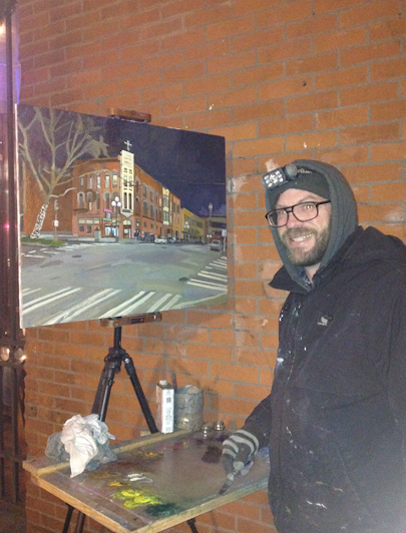 That I do not wander astray — l’éléphant!
That I do not wander astray — l’éléphant!
The t-shirt that I had been given, offered to return, but was allowed to keep, was special in two regards: not only did it bear the aforementioned images of an elephant, but the image on the front side of the shirt was an image of the elephant coming, and the image on the back was that of the elephant going. It was this static momentum of the shirt's character that I did not truly appreciate until I had worn the shirt several times at the Mission.
The shirt was special for still other reasons. Not only was its fabric made of much heavier cotton than the t-shirt that I had been wearing up until that point, but the elephant was a clear, but indirect statement of my dislike for Hillary Clinton. What is more, the cool air of fall was beginning to fill the city streets of Seattle.
As soon as I moved into Hing Hay Coworks, and my dual life, as online developer by day and impoverished homeless person at night, began, I started wearing the elephant t-shirt everyday at the Mission. From the gym to the Mission is about a 10-minute walk. From the time I arrive at the Mission until I take a shower after dinner less than two hours have passed. In the morning I put my shirt back on, and wear it for breakfast and on my back to Hing Hay, where I change into my office clothing. In effect, I never wear the shirt for three hours a day — less than 21 hours a week. Accordingly, it has become my customary uniform at the Mission. With the exception of my immediate arrival to, and subsequent departure from, the Mission on the following day when I wear my bright red Patagonia jacket, I am never seen at the Mission, but in two states: one with the shirt on, and one with the shirt off.
When Donald Trump won the 2016 presidential election and the Republican Party swept Congress, state legislatures, and governorships across the nation, for what in the Mission was a surprising and disappointing upset, my shirt took on new meaning. I even began receiving compliments from fellow dorm mates with whom I had never spoken. For, where before many were afraid to speak out, they now hesitated little. Indeed, I had won against all odds; Hillary Clinton and her party were defeated. Today, the shirt is a symbol of my political prowess and personal stamina. And, the elephant that comes and goes is the same that wears the shirt. For me, it is a symbol of my Mission life — the other half of my every day.
Early Morning Wake-Up Call
 The wake-up call at the Mission is currently 6:00 AM at which time we are told in a public broadcast the time at which we must be off the third floor and out of the building. Only once do I remember having ever heard the day and date of the week. It were as if time at the Mission were eternal, and there were nothing for which to plan in the morning, but the day ahead.
The wake-up call at the Mission is currently 6:00 AM at which time we are told in a public broadcast the time at which we must be off the third floor and out of the building. Only once do I remember having ever heard the day and date of the week. It were as if time at the Mission were eternal, and there were nothing for which to plan in the morning, but the day ahead.
Either before, during, or just after the announcement the lights come on. I set my alarm to 05:45, so as to avoid the rush. Unfortunately, my alarm has become a signal for others to do the same, and I am becoming increasingly tempted to wait for the wake-up call before arising. For the moment I can still enjoy the nearly empty locker room downstairs where I pack my belongings in anticipation of a rapid after-meal departure. No one is permitted to leave anything in the dorm room that they might hope to retrieve upon their return later in the evening. This policy, if it applies to all Seattle shelters, explains why it is so easy to spot a homeless person in public. For, unless he can afford to maintain an expensive storage locker somewhere in the city, he must carry his entire material belongings with him wherever he goes.
As many of my dormmates have to report to work even earlier than my alarm is set I am often awake before my alarm goes off. Rather than get up only to stand in line for breakfast downstairs or lie away listening to my dormmates go about their early morning affairs, I make good use of my iPhone's iBook application. The relative, early morning quiet makes focused reading an easier task than the highly erratic din of most evenings. I have yet to finish volume three of Abbé Augustin Barruel’s Mémoires pour servir à l’histoire du jacobinisme, but the close of each week brings me just a little closer.
I am usually downstairs before 6:00 AM just before the door to the kitchen opens. As my shared office space is only a ten-minute walk from the Mission, I arrive somewhat before 6:30 AM. There is no commute, no rush-hour traffic, and I am the first in the office. By the time the office begins filling at 8:30 AM it is toasty warm and everyone’s sour morning coffee is ready and waiting. The hour or so that I am able to spend at the office in complete solitude is a refreshing reprieve between each night at the shelter and my collective work space later in the day.
Nearly all, or all of my dormmates who work perform some sort of manual labor outside. Often discussed occupations include those of side-walk peddler, construction worker, street sweep, and painter. As hourly wage earners my dormmates can spend their meagre incomes on a motel room, an occasional night out, a new piece of clothing, or truly nutritious meals. I, in turn, receive nothing for my daily effort, but the promise of a better future and the satisfaction of realizing my own ideas. Still, my dormmates come to me for help to pay their rent on occasion, for I am one of a smaller number of those at the shelter who maintain several empty debit and credit card accounts in good standing. The Mission will not accept cash payments from its residents.
The other half of my dorm mates either walk the streets, find continued shelter at a nearby Starbucks, or browse a magazine rack at a 7/24 Seven-Eleven. In every case they spend the time waiting for the rest of the city to come alive so that they can find free indoor space to occupy for the rest of the day. A few of the more popular places include the Millionaires’ Club, Collections, the Lazarus Center, and the Seattle Public Library. A fewer number spend time at the YMCA. Only rarely do I see anyone there who works out. Most spend their time in the whirlpool or sauna where they seek to ease their physical discomfort or enjoy a bit of luxury in a world that would sooner spit on them as help them dig their way out. Then too, not a few of my dormmates actually enjoy the simple, unambitious life that several of my friends encouraged me to accept as my own while dissuading me from exercising my freedom of last resort. My friends simply appear unable to understand what was driving me to Tiger Mountain, and what has prevented me from going.
Until I was able to pay the deposit fee on my full-in membership at Hing Hay Coworks I spent each morning of my first two “homeless weeks” at the Corner Café — the same place where I had had my morning coffee every day for the previous year and a half. The walk up the hill under the cover of darkness every morning was very long, and the two to three hours that I spent waiting for the Seattle Public Library to open were hardly enjoyable. For, my body had not yet become accustomed to my shortened sleep schedule, and the additional cups of free coffee contributed little to my overall well-being. Even finding a suitable place in the library was not always easy, as it was difficult to find any place that was not occupied with other homeless people.
In some ways I was seeking to hide from the reality of my new circumstance. In other ways I was simply trying to preserve the dignity of my former self. In the end I have been able to adjust to my new reality and preserve what I so feared that I would lose — the opportunity to escape my current financial predicament and still make my mark on society. I absolutely refuse to spend the remainder of my life off the arbitrarily taken, hard-won earnings of others. The little that I am able to recover from what was forcefully taken from me through taxation by the state is not enough to sustain me. This was my situation before I became homeless, and it is my situation now. What is more, the strategy to escape this predicament is pretty much the same — only the tactics have changed with my new set of circumstances.
An Awkward, but Reasonable Strategy Forward
Surely there are just as many miserable people at the top of a society's social ladder as there are at the bottom, and surely you can find happy people in all walks of human life. For, the well-being of the individual depends on much more than his material possessions. In the end, each of us occupies a unique social perspective that no one else shares, and it is up to each of us to make the most of his own perspective.
Amin Al Beladi
 On the second day of my arrival at the Mission I walked the neighborhood in the early morning to see what was nearby; it was not nearly as bad I originally imagined. Indeed, within a one-minute walk of the shelter I discovered a brightly lit, first-floor setting encircled by glass and filled with a variety of different looking work spaces. Curious and longing for my studio SoHo at Paul Revere Apartments on First Hill, I explored further and discovered the Pioneer Collective. A little online investigation later in the day introduced me to the concept of shared or collective work space. After nearly a week of shopping around I discovered Hing Hay Coworks in the International District, for it was the cheapest, most available collective work space within walking distance of the Mission.
On the second day of my arrival at the Mission I walked the neighborhood in the early morning to see what was nearby; it was not nearly as bad I originally imagined. Indeed, within a one-minute walk of the shelter I discovered a brightly lit, first-floor setting encircled by glass and filled with a variety of different looking work spaces. Curious and longing for my studio SoHo at Paul Revere Apartments on First Hill, I explored further and discovered the Pioneer Collective. A little online investigation later in the day introduced me to the concept of shared or collective work space. After nearly a week of shopping around I discovered Hing Hay Coworks in the International District, for it was the cheapest, most available collective work space within walking distance of the Mission.
During this same week I received a phone call from a colleague of my good friend, Sadykh Sadykhov and was offered a job packaging food for overseas flights to the Middle East. Had I accepted, I would be earning enough money today to pay for my own apartment and food. What I would not have is the time and energy left necessary to develop my own online company and secure my long term future. So, I asked, if my friend’s colleague could not wait until the end of the week for my decision, and he said, yes.
It was my former student, Amin Al Baladi, at King Abdulaziz University, who provided me with my decision. For, it was Amin who paid for 20 online English lessons in advance and made it possible for me to pay a substantial portion of the deposit on my new office space at Hing Hay Coworks.
Amin will always share a special place in my heart. At first, he simply offered money, and I told him that, as his former teacher, I could not accept it. And, then I fell upon the idea of the Grammar Captive webinar.
Amin found me on Verbling, an online English language forum, and remembered me as the teacher who taught him a valuable lesson about individual responsibility and the importance of fair play in the classroom. Whereas other students made the sacrifice necessary to attend class regularly and punctually, Amin and several of his classmates, did not. Rather than allowing Amin and the others to pass, I exercised a little used university rule, and failed them all in order to set an example. My reputation as a strict, but fair instructor spread quickly through the department, and both my students and me, enjoyed the fruits of my action.
Whereas other teachers feared to become unpopular, I did not. As a result, I became both respected and popular among my students and won Amin's friendship. Students who did not care about fair play went to the other instructors for guidance, and my students and I were free from their incessant, burdensome whining.
Hooray! Hing Hay!
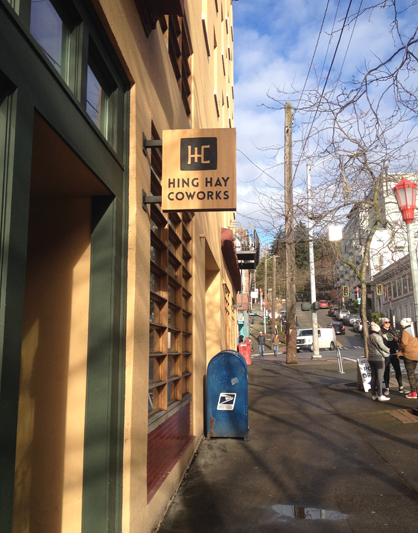 On Monday, October 3, 2016 I began the other half of my dual life and abrupt change from abundant solitude to relentless and restless communal living. Thanks to Eliza, the Coworks’ Office Manager, I was allowed to pay only a portion of my deposit and the rest in installments. From there it has been a financial struggle to make ends meet, but a very productive work effort has resulted.
On Monday, October 3, 2016 I began the other half of my dual life and abrupt change from abundant solitude to relentless and restless communal living. Thanks to Eliza, the Coworks’ Office Manager, I was allowed to pay only a portion of my deposit and the rest in installments. From there it has been a financial struggle to make ends meet, but a very productive work effort has resulted.
Let it suffice to say, that my full-in membership at the Coworks, less the deposit that I pay out of my own pocket, exactly offsets my SSI entitlement from the State of Washington. In other words, at the beginning of each month I transfer public funds from the State of Washington to the City of Seattle and for this transaction receive “free office space” in return.
Hing Hay Coworks is far less motley than the Mission, but contributes considerably to the contradictory nature of my current existence.
My New Municipal Work Environment
 As the collective space is funded by the City of Seattle, and many who utilize the space are employed by the same, most of my colleagues are modern liberals in their political belief and disposition and were sorely disappointed that Hillary lost the election. This makes it difficult for me to engage in political dialogue on the one hand, but keeps me focused on my online endeavor and financial salvation on the other. My bet is that none of my colleagues even know the difference between classical and modern liberal thought
As the collective space is funded by the City of Seattle, and many who utilize the space are employed by the same, most of my colleagues are modern liberals in their political belief and disposition and were sorely disappointed that Hillary lost the election. This makes it difficult for me to engage in political dialogue on the one hand, but keeps me focused on my online endeavor and financial salvation on the other. My bet is that none of my colleagues even know the difference between classical and modern liberal thought
Indeed, it is difficult to convince those on the government payroll that society would be better off without them, and this for two reasons: one, they depend on government for their own existence; and two, they are told that the government is there to serve the people, and they truthfully believe that they are doing just that.
As people regularly turn to government in search of solutions, those in government believe that it is up to government to find them. What those in government fail to understand is that people naturally turn to government, because government has taken something from them with the promise to give something in return, not because the people believe that government can do better for the people than what the people can do for themselves. Then too, government goes out of its way to convince its citizenry how miserable their lives would be, if it were not for government, and then makes their lives miserable, if they do not agree. Moreover, as most people have never experienced society in the absence of the state, few are able to comprehend their own society without it. What complicates the matter even more is the confusion between the state and government. For, compulsory and voluntary government are not the same, and those who stand up against the former in favor of the latter are often accused of being against both. Anarchy in a political sense is by no means chaos in a social sense, and those who fear the absence of the state fail to understand that it is the state that breeds anarchy in a social sense.
Important is that both Hing Hay and I believe in social order, and for this reason we cannot help but get along.
In the end, so long as government continues to take by force what people would prefer to keep as their own, people will continue to expect something in return — even, when it is not the role of government to provide anything, but protection for what people would prefer to keep as their own.
The tendency for politicians to create new laws, rather than uphold or eliminate the old ones is modern liberal expectation. For, in the liberal mind society is always changing, and the laws must accommodate these changes. That there could be anything inherently fixed about human social organization is simply antithetical to how they think. It were as if the human genome never makes it past the womb. This, of course, is a trap that both politicians and their electorate find difficult to escape, for politicians who do not cater to their electorates impatience are considered ineffective. And, governments that are not forever bringing about change are fearful that they will lose their ability to manipulate and control. Change is indeed power, for when the rules are forever changing, everyone's sense of right and wrong is diminished, government is called upon to restore order, and thus impose its own sense of moral authority. Our founding fathers understood this ruse and purposefully made it difficult to change the rules. No matter, Lincoln, Wilson, and FDR all new better, and the heavy hand of empire now prevails where political liberty and the market economy once flourished.
 Markets inevitably provide better solutions, but market solutions take time, because they require the voluntary participation of everyone involved. Governments on the other hand, can intervene directly and often with dramatic effect. It is these coercive acts that disrupt voluntary market participation and create more problems than they solve. Try, however, to get government officials not to act, when a small, but powerful, well-organized group of individuals demand action. Only the best politicians have the courage and wisdom to resist, but such politicians are difficult to find. For, most fear that inaction signals a failure to respond and thus a negligence of government duty. In the past they could turn to the wisdom of our founding fathers and the Constitution. Today, they leave all interpretation of the Constitution to the courts, and write law after law in an effort to curry favor among those with money and those who are most likely to vote for them in the next election. What is worse, they justify each of their decisions with an ever-changing set of governing principles that may or may not apply to the action that they have taken, but are popularly viewed among the general public. Few ever think beyond their own self-interest and what the general public is most likely to believe with the least amount of thought and consideration.
Markets inevitably provide better solutions, but market solutions take time, because they require the voluntary participation of everyone involved. Governments on the other hand, can intervene directly and often with dramatic effect. It is these coercive acts that disrupt voluntary market participation and create more problems than they solve. Try, however, to get government officials not to act, when a small, but powerful, well-organized group of individuals demand action. Only the best politicians have the courage and wisdom to resist, but such politicians are difficult to find. For, most fear that inaction signals a failure to respond and thus a negligence of government duty. In the past they could turn to the wisdom of our founding fathers and the Constitution. Today, they leave all interpretation of the Constitution to the courts, and write law after law in an effort to curry favor among those with money and those who are most likely to vote for them in the next election. What is worse, they justify each of their decisions with an ever-changing set of governing principles that may or may not apply to the action that they have taken, but are popularly viewed among the general public. Few ever think beyond their own self-interest and what the general public is most likely to believe with the least amount of thought and consideration.
It is a vicious circle that can only be broken with time and education. Unfortunately, time is not on our side, and our academicians are regularly called upon to provide expertise for smarter government. Inevitably, smarter government means more technicians, more social engineering, and more unintended consequences. In short, those who are best positioned to provide the needed education are the least qualified to do so. For, in a free society, there are no better arbiters of power and wealth than those who voluntarily compete in a market place governed by a judicious enforcement of the right to property and person. If government would only enforce these latter honestly and fairly, most of the problems for which the technicians are called upon to resolve would not exist or eventually disappear. For, in the market place the livelihoods of real people are at stake, and nonsense is simply not tolerated. If only the modern liberal could understand this, he or she would also understand why their favorite political party took such a beating in 2016, and why what comes after will change very little despite their most grievous concerns.
In effect, American society has lost faith in the very market mechanisms that once made it great, and has put its faith into highly corrupt government institutions instead — the very institutions that our forefathers struggled so very hard to avoid, and many that they could barely have imagined.
Truly, America has lost its way. Instead of insuring our sovereignty as a people, we have opted for empire and a central form of government that listens to its citizenry only so that it can better control and manipulate us.
The inevitable result of modern liberal, public largesse is an open trough from which just about everyone who knows anyone can get something. It is market inefficiency and social ineptitude at its worse and will eventually destroy both the City of Seattle and the nation as a whole. For the moment, the city continues to grow, and the long term effects are barely visible. Our demise at the national level is already very apparent irrespective of who is elected into public office.
A Footnote for My Homeless Readership
 In the short-run working migrants and non-working vagrants from across the continent and beyond enjoy a pool of seemingly unlimited free resources in the city of Seattle. Indeed, several of my dormmates wonder why I do not take greater advantage of all the free goodies. And, if it were not for the fact that I spend my life indoors without a boss, rather than out-of-doors with a boss, my unpaid development effort with an uncertain future at Hing Hay Coworks would surely be the butt of many a joke.
In the short-run working migrants and non-working vagrants from across the continent and beyond enjoy a pool of seemingly unlimited free resources in the city of Seattle. Indeed, several of my dormmates wonder why I do not take greater advantage of all the free goodies. And, if it were not for the fact that I spend my life indoors without a boss, rather than out-of-doors with a boss, my unpaid development effort with an uncertain future at Hing Hay Coworks would surely be the butt of many a joke.
Who knows? It probably is anyway. Simply I do not spend any time at Starbucks exchanging Mission gossip with my dormmates, and thus fail to hear them.
Liberal Dialogue
An important lesson reinforced in my friendship with Robin Koerner, the Blue Republican and only person to support me directly in my hunger strike against the American spoils system, is the need for non-confrontational political dialogue. Although I fundamentally reject his contraposition of means and ends in today's political dialogue as a personal world perspective, he does render clear an important facet of the bipolar nature and equally neurotic character of the American political scene. Thought and feeling, means and ends, are surely not always one, but they do arise in the same person, and are not something that should divide a society politically.
In this spirit I will address each of the primary, legitimate concerns of the modern liberal mindset in what follows -- namely, gender, race, and religion.
Gender at Hing Hay
 An important contradiction between my working life at Hing Hay and my residential life at the Mission is gender-related, for the management and preponderance of my co-workers at Hing Hay are female, and the management and preponderance of residents at the Mission are male. In one way, this gender distinction helps me to keep the two worlds separate; in another way it is sometimes a source of minor, but poignant stress and confrontation.
An important contradiction between my working life at Hing Hay and my residential life at the Mission is gender-related, for the management and preponderance of my co-workers at Hing Hay are female, and the management and preponderance of residents at the Mission are male. In one way, this gender distinction helps me to keep the two worlds separate; in another way it is sometimes a source of minor, but poignant stress and confrontation.
Men and women are simply not the same, and no matter the social roles that each gender fulfills, each fills the same roles differently. Thus, life at the Coworks and Mission can be very different and confused at times. For this reason among others I tend to keep to myself at both places and listen and observe more that I speak.
Indeed, the whole notion of feminine rights is for me just another special interest group demanding another cut of the political spoils obtained by a rapacious government that pretends compassion for the plight of the individual, but fosters social division for the purpose of political control.
If women were so good at being men, then they would be paid what men are paid, and there would no need to involve government intervention to correct the so-called inequity. If women want to organize politically, it is surely their prerogative to do so, but please do not expect me, a male, to support the effort. On the contrary, I will enforce the right of the individual and any social convention that promotes social order among those who voluntarily adhere to that convention. If individual women prefer to reject this convention, either separately or together, then they are surely free to disassociate and organize on their own. Simply, do not impose their newly found social organization with the force of government on those who voluntarily adhere to another convention that is more generally accepted and has stood the test of time. The same applies to gays, lesbians, and any other group of individuals who wish to organize along carefully selected lines of commonality and difference and assert their behavior via the state as acceptable behavior for everyone.
Yes, technology changes and with it the ways in which human beings interact. Take full advantage of those changes, but to not impose on the individual politically, what she or he would voluntarily reject as an individual.
I do not care who is in charge of government, so long as those in charge defend my property and person, and right to pursue my own happiness alone and in the presence of others. I do not need government to tell me how to think or act, and am perfectly content to finding my own way along with everyone else through voluntary established social conventions and free-market exchange. Using government to change society is simply pathetic and should be resisted at all human cost.
Protect the rights of the individual and the community with which he voluntarily associates, and allow new communities to flourish, but do not impose on the individual, nor his community a way of life that is alien to either. The role of government is not to dictate, but to protect. It is not to impose, but to defend and allow to flourish.
Race Relations at the Mission
 When I returned to the United States in the spring of 2007, I took up residence in Seattle’s International District where I remained for six months before returning abroad. Having just spent nearly 17 years in East Asia I was amazed by what I found -- not so much in the International District, but in other parts of the city. Still, I had little time to reflect on what I discovered, as I was preoccupied with personal and family matters, and employment was easier to find overseas than at home. Indeed, it would not be until 2008, just after my return from my first year in Saudi Arabia, that I began serious reflection on the changes in American society that had occurred during my absence.
When I returned to the United States in the spring of 2007, I took up residence in Seattle’s International District where I remained for six months before returning abroad. Having just spent nearly 17 years in East Asia I was amazed by what I found -- not so much in the International District, but in other parts of the city. Still, I had little time to reflect on what I discovered, as I was preoccupied with personal and family matters, and employment was easier to find overseas than at home. Indeed, it would not be until 2008, just after my return from my first year in Saudi Arabia, that I began serious reflection on the changes in American society that had occurred during my absence.
It was the first time that an American with West African origin had ever run for presidential office in my lifetime, and I was intrigued by Barack Obama’s presidential candidacy. When I left the United States in 1991, it was clear that African Americans were gaining a foothold in American government, but I do not recall having seen anyone other than an occasional clerical person or police officer of West African and/or slave descent.
Having just spent nine years in Japan and seven long years in Hong Kong I now understood well what it meant to be part of a racial minority living among a racial majority. Toward the end of my stay in Japan I had toyed with the idea of dying my blond, graying head of hair black, but realized that there was little I could do about my blue eyes and other distinctively different racial features. Whereupon I realized that race, although an important social factor that you cannot simply escape, is something that you can learn to deal with and work around. Indeed, once you learn how it works and how it is used by others to make their life better at your expense, you also learn how to protect yourself against it. So, I was well prepared for my first racial encounters at the Mission.
Indeed, my first encounter was in the shower room, where I was referred to as a “white boy” in someone else's conversation. I intervened and asked what was meant by the remark. I was told, “Nothin”, and let it go at that. On the following day, still another racial innuendo was heard from the same person, but this time directly to my face. I called the person out, and asked him, if he were not seeking to instigate racial tension among our fellow dormmates, and he backed off. During the next couple of weeks several more racial encounters were noted, some that included me, some that did not, but in every case those initiating the racial side of the encounter were inevitably those who are generally the first to complain of racism in the United States — those who would claim to be Black Americans. It was a sorry state of affairs, because the racial appearance of the Mission's senior management was what America commonly refers to as black. The game that was being played by several of my fellow dormmates was now very clear.
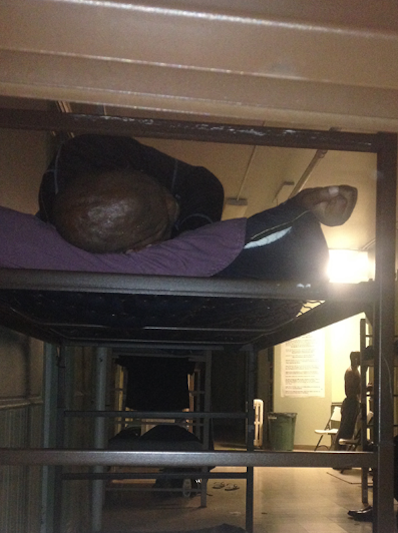 So, I followed the same course of action that I followed while living overseas. Everywhere that I found myself taking a racial side I would divert my own or another’s attention in a different direction. It worked then, and it is working now. One day, I overheard a discussion about how to overcome the problem of race in the Mission, and I mentioned my strategy. The reply was, “Yeah, it is easy for you when you are part of the dominant race”. I did not recount what had already become for me a substantial history of Mission events, and simply stated, “Then too, when everything can be made into a racial issue something is very wrong”. A new topic was quickly found, and I have not heard the same discussion since.
So, I followed the same course of action that I followed while living overseas. Everywhere that I found myself taking a racial side I would divert my own or another’s attention in a different direction. It worked then, and it is working now. One day, I overheard a discussion about how to overcome the problem of race in the Mission, and I mentioned my strategy. The reply was, “Yeah, it is easy for you when you are part of the dominant race”. I did not recount what had already become for me a substantial history of Mission events, and simply stated, “Then too, when everything can be made into a racial issue something is very wrong”. A new topic was quickly found, and I have not heard the same discussion since.
Long before I came to the Mission it was clear that feelings of inferiority on one side of an argument do not necessarily imply feelings of superiority on the other side. Further, I have learned that it is not the obligation of the one side to assuage the feelings of the other side. No, I do not buy into the notion of “white privilege”, but do recognize clearly that feelings of superiority and inferiority are attitudes for which each individual is personally responsible, and that each can either exacerbate or mitigate depending on his desire to get along.
I have spent 23 of the past 25 years overseas in six countries on two continents and several more years in two additional countries on still another continent. In none of these countries is race as problematic as it is in the United States. Given that slavery was once a world-wide phenomenon, I do not see America’s history of slavery to be the root cause for racial tension in the United States. The problem lies elsewhere, and an important source of the problem is American government itself — those in American society who would divide the nation along racial, religious, and ethnic lines in the name of unity.
Those who would live the past in the present, will know only the past. Those who understand that history repeats itself have the power to bring about important change in the future.
American Age Discrimination
 America has appeared bent on chasing me from the labor market because of my age and has tried, as a result, to force me into retirement before I am ready. No one, who meets me and does not know my age, has ever believed that I am over 60 and most peg me somewhere between 50 and 55. America's insistence on my retirement is even more amazing in light of our nation’s recent general election in which certain candidates campaigned on the idea that the minimum age to receive retirement income should be raised.
America has appeared bent on chasing me from the labor market because of my age and has tried, as a result, to force me into retirement before I am ready. No one, who meets me and does not know my age, has ever believed that I am over 60 and most peg me somewhere between 50 and 55. America's insistence on my retirement is even more amazing in light of our nation’s recent general election in which certain candidates campaigned on the idea that the minimum age to receive retirement income should be raised.
In America one complains about gender, religious, and race discrimination, each of which affects only a fraction of the total population. Discrimination with regard to age — a characteristic that eventually applies to everyone — is simply ignored in contrast.
In other countries of the world it is expected that one places his age on his resumé and employers regular advertise the age range that they prefer. In America one does not, because we are told that age should not be a factor in determining one’s ability to perform. Guess what, America? Like so much of the rest of your PC protocol nonsense, age is an important factor and depending on the nature of the employment older is preferred to younger and younger is preferred to older.
The tragedy is that I am being forced to age more quickly than I should, because I am now deprived of sleep and a proper diet. Will America get its way and force me to become older that I truly am? Unfortunately, I do not have the answer to this question, as it depends on how quickly I can dig my way out of the mire into which American society has shoved me. Certainly, the market place will have an important say in my success. Thankfully, the English language industry is a global industry and does not depend on America for its existence!
Government Bureaucracy and the Power of Imaginative Reality
 Of all the things that have happened to me this year, what happened to my EBT entitlement when I joined the YMCA is by far the most absurd. Not surprisingly government was at the source of the absurdity.
Of all the things that have happened to me this year, what happened to my EBT entitlement when I joined the YMCA is by far the most absurd. Not surprisingly government was at the source of the absurdity.
In order to enjoy my second discount at the YMCA I was asked by The Y to prove that I was homeless. When I inquired how to go about proving the absence of a private residence rather than the presence of one, I was told to go to the state’s Department of Social and Health Services (DSHS) and obtain official homeless certification. The ease with which I was able to obtain such can perhaps be explained by what follows.
Indeed, I had only to go, queue, and wait my turn to receive still another piece of the public trough. So common is my plight that the DSHS has a standard form dedicated to this very purpose. Upon being presented with the requested documentation, however, I was told that my EBT allowance would be reduced. My elation at The Y suddenly turned too deep concern, as I pondered how many more such shocks awaited me in the months ahead. How on earth had my having applied for formal status as a homeless person effected my EBT allowance? When I asked by how much and was told by half I bordered half-way between despair and anger. I inquired still further and soon listened to the following reasoning:
Because you are now homeless, you do not have a private residence, and your rental obligations are substantially reduced. Accordingly you must have more money for food, are less needy, and are therefore entitled to a much smaller allowance.
I simply could not believe what I was hearing: a person with a residence of his own is more needy than a person with no residence, and is thus entitled to more food? Only the state could muster such logic. For what it is worth by the way, this is one of the several official definitions of American homelessness -- none of it describes my feeling of utter alienation toward the society into which I was born.
 That afternoon I called my friend at the DSHS in White Water and told him that something unbelievable had happened to me at the DSHS office on Capitol Hill. As I was surely somewhat incoherent, and he has been in the direct service of government for the past three decades, he did not respond. Nothing could surprise him. So, I called again that evening and was delighted that I could offer him a new government absurdity with which he, too, was not yet acquainted. Whereupon he promised to look into the matter on the following day. This he did thus confirming that the Capitol Hill DSHS office had not acted arbitrarily. It was simply following the rules.
That afternoon I called my friend at the DSHS in White Water and told him that something unbelievable had happened to me at the DSHS office on Capitol Hill. As I was surely somewhat incoherent, and he has been in the direct service of government for the past three decades, he did not respond. Nothing could surprise him. So, I called again that evening and was delighted that I could offer him a new government absurdity with which he, too, was not yet acquainted. Whereupon he promised to look into the matter on the following day. This he did thus confirming that the Capitol Hill DSHS office had not acted arbitrarily. It was simply following the rules.
American government bureaucracy had struck again and my carefully calculated budget that would allow me to maintain a, by now, only fair credit rating, pay for my newly acquired storage space in Federal Way, maintain my iPhone account with online access, provide for a semi-private work space at Hing Hay Coworks, cover my food and lodging at the Bread of Life Mission, and my gym expenses at The Y was decimated. Indeed, if I did not find another source of income soon, I would not be able to sustain my previous life-style on First Hill, albeit substantially compromised.
I was overcome with the same sense of anguish that i had had during the first three days of my homelessness. That night in the Mission I grasped my box cutters tightly and then tossed them in my hand until they felt light and ready to use -- the power of imaginative reality.
Elements of Transition
As a preadolescent I read Superman and Batman in colorful comic books and watched the Lone Ranger and the Three Musketeers on black and white television. As a young adolescent I read the complete works of Edgar Rice Burrough's Tarzan and Sir Arthur Conan Doyle's Sherlock Holmes. All of this taught me the importance of clothing and its absence in defining social role. Mad Magazine did not appear in my life until I reached high school, but still I never bought my own copy.
Certainly my parents did not mind, so long as I continued to get good grades at school. Today, these childhood lessons have become a living legend.
The YMCA
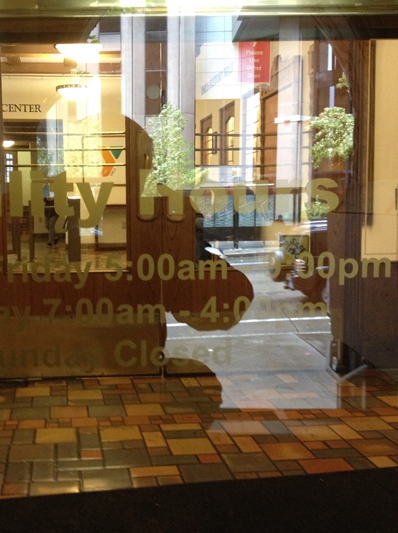 While still a homeless regular at the Seattle Public Library I past by the YMCA on my way to the Mission and inquired about the facilities. Whereupon I was given an extensive tour of all six floors. When I asked how much it would cost a homeless, senior citizen such as myself I was simply ecstatic. Not only were the facilities at The Y so much better than those at 24-Hour Fitness where I had been in attendance for more than a year, but they were available to me at a quarter of the price!
While still a homeless regular at the Seattle Public Library I past by the YMCA on my way to the Mission and inquired about the facilities. Whereupon I was given an extensive tour of all six floors. When I asked how much it would cost a homeless, senior citizen such as myself I was simply ecstatic. Not only were the facilities at The Y so much better than those at 24-Hour Fitness where I had been in attendance for more than a year, but they were available to me at a quarter of the price!
As my gym clothing was in storage in Federal Way I waited until I could make the journey there with Michael Quinn before joining The Y and paying my first month’s membership.
My daily walk up First Hill to the Corner Café was simply not the same as going to the gym everyday — no matter how quickly I walked up the hill. After three months I am still performing at only 80% of where I was while at 24-Hour Fitness only two months before I became homeless. In light of this dramatic change and the new facilities I have made important adjustments in the way I work out.
In the end, I am grateful that I can go to the gym before I must return to the nightly drama of the Mission, for it makes smooth the transition from online developer by day and homeless person by night. Indeed, the gym for me in late afternoon does what Hing Hay is for me in the very early morning.
My Physical Well-Being
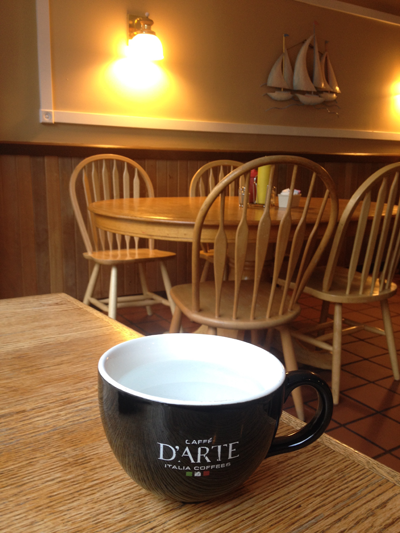 Of everything that has happened to me since my departure from Paul Revere Apartments my health is my greatest concern. Where before my nutrition and sleep were both regular and consistent, now they are irregular and inconsistent. My gym habits although considerably different are, at least, regular.
Of everything that has happened to me since my departure from Paul Revere Apartments my health is my greatest concern. Where before my nutrition and sleep were both regular and consistent, now they are irregular and inconsistent. My gym habits although considerably different are, at least, regular.
Where before I was getting three full cycles of sleep, and on occasion only two, now I can rarely count on more than two, and on occasion receive only one. Living in a dorm with such an ever changing and motley group of people results in many a restless evening. Lying awake for long periods of time between cycles is a common occurrence, that provides physical, but not mental rest. Although my body appears to have accustomed itself to my new rest schedule, my performance at the gym is a direct indicator of how my body has been negatively affected by it.
Before I went on my hunger strike I was able to push 180 lbs plus the bar on the declined bench, now I am barely able to push 140 lbs plus the bar on a flat bench. This is a significant drop in performance. Fortunately, my sagging performance at the gym is not my greatest concern as I do not depend upon it professionally. Rather, I am concerned about the hidden side effects brought about by the sudden reduction in sleep.
My diet has also changed dramatically. Where before I ate nearly entirely organic, I am now lucky, if I eat any organic food in any given week. There are several days every month during which I eat no lunch, and every Sunday is hit or miss, as neither breakfast, nor dinner are served at the Mission. My protein-rich rich mornings and carbohydrate-rich evenings have been completely altered, as my most important source of protein is obtained at lunch, and I consume carbohydrates throughout the day. Then too, I am only able to afford the lunch of my choice for one half of every month. In order to preserve my immunological system I take full-complement vitamin and mineral supplements on a daily basis, but can go for many days without even these when I run out and do not have the cash to replenish them.
I am also very concerned about my intake of grains. Where before I ate bread, cake, cookies, chips, pastries, and other similar grain-based foods only on special occasions, now I eat them on a daily basis. None of this is by choices, for one must eat in order to live, and I have neither a kitchen, nor sufficient funds to buy what I know to be healthy.
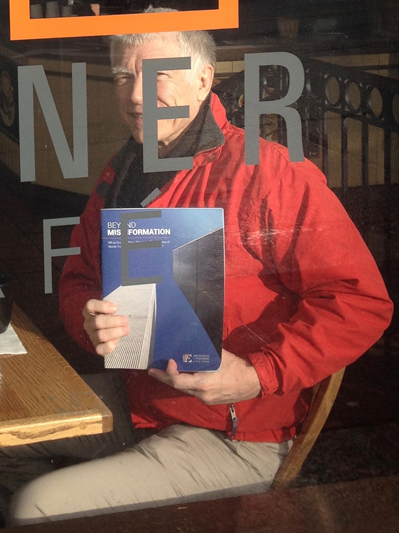 In one way, American society is getting its way, for I am rather certain that the past three months and the many months that lie ahead will age me far more quickly than I would have aged had I not been made homeless. It is the most tragic part of my new existence.
In one way, American society is getting its way, for I am rather certain that the past three months and the many months that lie ahead will age me far more quickly than I would have aged had I not been made homeless. It is the most tragic part of my new existence.
Throughout my life I have watched people invest in material wealth and grow old around me, while I have invested in human capital and sought to maintain my youth. I understood well that I would someday have to be working while others were retiring and planned ahead accordingly. What I was not expecting was the rejection that I have received because of what appears to be an extraordinarily large number on a little piece of paper. I am now grateful that I recognized very early on the importance of digital language and included it in my continued investment in my other spoken languages. For now, I depend on it to overcome the age-prejudice with which I have been confronted in the American labor market.
My fallen gym performance aside I have now incorporated basketball, squash, and volley ball into my routine, where before I was only lifting weights. In the weight-room I am also performing more reps with lighter weights. Shooting baskets, playing volleyball, and hitting squash balls are all very different forms of physical activity and each utilizes different sets of muscles in very different ways. What is more, my hunger strike eliminated nearly all of my belly fat, very little of which has returned. Where before I was struggling to break the 190 lbs threshold, now I consistently weigh in at less than 180 lbs. For someone over six feet in height, I remain one very fit human being who can tumble and roll without having to worry about breaking anything.
No, America, I am not 67 in the normal sense of the word, but if you are an American who has ancestors originating from a slave plantation and/or West African nation, or if you are able to bear children, then you may well imagine the little extra effort that I must put out to achieve the same as others who do not suffer from my disability.
Beyond Misinformation and the Corner Café
 On Christmas Day 2015 I presented two signed copies of Beyond Misinformation to the Corner Café and placed them on the café’s reading table. On the following day both copies were gone never to return. When I asked what had happened to them I was told that they had been stolen.
On Christmas Day 2015 I presented two signed copies of Beyond Misinformation to the Corner Café and placed them on the café’s reading table. On the following day both copies were gone never to return. When I asked what had happened to them I was told that they had been stolen.
From December 27, 2015 until September 11, 2016 I took with me two additional copies of Beyond Misinformation and placed them on the table at which I sat to drink my morning coffee — one copy face up, the other face down. For, in this way both the back and front covers could be seen. During this time period I probably missed only three days due to other appointments. Never once did anyone stop and ask to examine one of the copies more carefully, comment about their contents, or even ask what they were about.
On Christmas Day 2016 the Corner Café closed its doors. It was a fitting ending. On the door the café's management blamed the landlord for refusal to renew the contract. Was it not more likely that the café refused to accommodate the increase in rent that everyone else in the neighborhood was also compelled to pay?
Dong-Guk Nabi
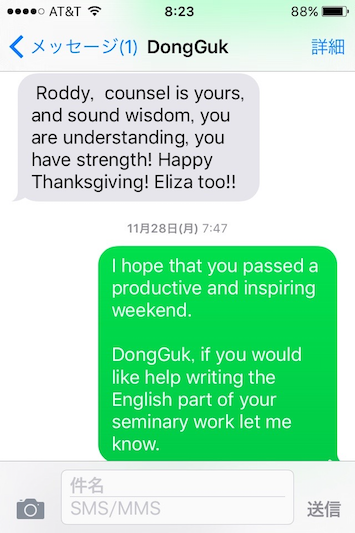 Shortly after my discovery at the DSHS Office on Capitol Hill Michael Quinn informed me that he was acquainted with an aspiring Korean minister in need of English language lessons, and he asked, how much I would charge. We settled on a price somewhat higher than what I was receiving on Cambly, and I was paid upfront. My unbalanced budget was suddenly balanced, and I could move forward. Elated was I. Once again, the private sector offered promise.
Shortly after my discovery at the DSHS Office on Capitol Hill Michael Quinn informed me that he was acquainted with an aspiring Korean minister in need of English language lessons, and he asked, how much I would charge. We settled on a price somewhat higher than what I was receiving on Cambly, and I was paid upfront. My unbalanced budget was suddenly balanced, and I could move forward. Elated was I. Once again, the private sector offered promise.
The challenge that I faced was getting the student to come at a designated time more than once a week, and after the sixth lesson it became clear that it would not be possible. I was not alone in my assessment of Dong-Guk’s lack of interest, and Michael stopped payment. Then too, Federal Way was a long way to come just to learn how to form inside his mouth the many differences between the many tens of phonetic pairs that I had created for him. No, Dong-Guk was not Marry Poppins, and I was not Professor Higgins, but for a brief moment Hing Hay Coworks was a reenactment of My Fair Gentleman, or was that Lady?
In any case, it was working with DongGuk for several weeks that inspired a new local initiative to earn income — GC Tutor.
Porfirio Andara
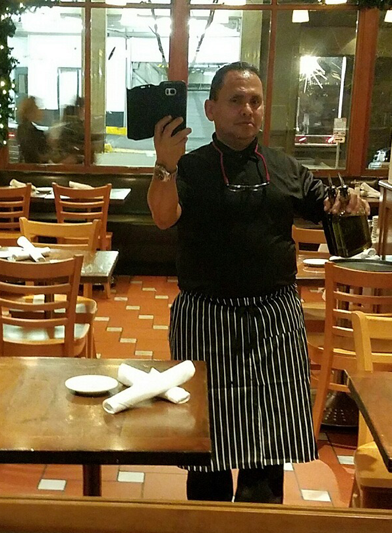 Porfirio is a Honduran immigrant who, while at the Mission, recognized in me a person of high professional quality that he could likely hire at a very affordable price. And, so it came to pass. The result of our engagement has been nothing but success, but still he complains that USD 16 per hour is too much. As it is, he receives more hours of labor than those for what he pays in light of our common financial plight and previously shared experience at the Mission.
Porfirio is a Honduran immigrant who, while at the Mission, recognized in me a person of high professional quality that he could likely hire at a very affordable price. And, so it came to pass. The result of our engagement has been nothing but success, but still he complains that USD 16 per hour is too much. As it is, he receives more hours of labor than those for what he pays in light of our common financial plight and previously shared experience at the Mission.
Within a period of three weeks I have made it possible for Porfirio to secure his Green Card, obtain a permit for serving alcohol in the City of Seattle, and prepare and serve food in King County. I have also helped him with two online employment applications, took, on his behalf, a 100-question survey that measured his suitability for work in a prominent international hotel chain, and watched as he went from dishwasher at Nordstrom’s to a server’s assistant at an upscale Italian restaurant in Westlake Center in downtown Seattle.
In effect, I became his tool to overcome the cultural, online, and certificate barriers that stand between American society and him. And, in exchange I was just able to make it financially through the months of November and December.
Unfortunately, in a stroke of bad luck, he recently broke his shoulder when the front wheel of his newly purchased bicycle fell into a light rail track on his way home from Hing Hay. His misfortune has served to remind me of how fragile my own financial circumstance are, and why Grammar Captive must move forward as quickly as possible.
Family and Friends
Once again, I have realized the importance and limitations of friendship. Once again, I have realized the folly of family and its inexorable ramifications. Family and friends must both be nurtured, or they wither in time. Family is, however, not friendship, and family, if the members are not good friends, is not worthy of the name family.
Family Closure
 As it was becoming clear that American society cared little, or not at all, about my financial plight, and as I had resigned myself to the fact that the only way that I could survive my current crisis was with some sort of charitable assistance, I decided to reach out to what little remains of my immediate family.
As it was becoming clear that American society cared little, or not at all, about my financial plight, and as I had resigned myself to the fact that the only way that I could survive my current crisis was with some sort of charitable assistance, I decided to reach out to what little remains of my immediate family.
Since my mother’s death and my return to Hong Kong there had been no direct communication between my family and me. Indirect communication was certainly possible, as I am pretty much an open book on the internet. The rest of my family was barely present, however, so I had little idea what was going in their lives.
The separation between my family and me had begun long before my East Asian sojourn began and was significantly aggravated by debt collectors when I was force to default on my student loans while still resident in Japan. As my father died while I was in Japan, I did not attend his funeral. My attendance would have been of little comfort to anyone, for at the time of my father’s death, he was no longer the man that I had once respected and revered as a child. To this day I do not know whether the wife of my already deceased older brother read the requiem that I wrote in lieu of my presence. This said, I believe that she did, as I remember my mother having asked me to remove a passage from my elegy to my deceased father.
Between my father’s and mother’s deaths I communicated with my mother about once a month by telephone, and I visited her twice, each time for one week. My last visit was both traumatic and heart-warming. On the one hand, it was clear that my mother was suffering from dementia, and on the other, she rejected my offer to live with, and care for her. She wanted me to be close, but not in the same house. It simply did not make sense, as I would have had to leave Hong Kong and reestablish myself in Michigan with no savings to make the transition possible. My effort to find employment as an economist at Central Michigan University had failed, and I would have had to return home without a home and no employment. After this, I continued to communicate with my Mom by telephone, but my little brother took over her care and our parents’ estate.
My mother’s funeral was a sad affair largely dominated by my little brothers’ church friends. The only members of my mother’s extended family were my sisters-in-law, the husband of my deceased brother’s wife, my niece, my little brother, and his wife. Also, present were my little brother’s former wife and her spouse. It were, as if my mother had died without any friends. I recall having sat apart from the others present as the service was conducted. It rained during the funeral and the night sky was filled with lighting. It was reminiscent of my experience when I paid my last visit to my parents’ home before my mother was moved to an assisted care center by my brother.
Although I was grateful to my little brother for having called me “home” to say good-bye while my Mom was still on her death bed, the matter ended badly when I insisted on a record of my parents’ estate before I returned to Hong Kong. What should have been a simple matter turned into a bitter confrontation, and I ended up spending the night at the Detroit Metropolitan Airport, rather than as a guest in my little brother’s home. Then too, I must have left a very bad impression, when I drank so much wine at my mother’s wake that my long absence at the dinner table while I vomited in the rest room must have left a bad impression. Then too, between me and that part of my family with whom I wished very much to sit was my brother’s minister -- an individual who appeared to be more concerned about his faith than the general welfare of my family and me.
In any case, it was the big hug that I received from the husband of my deceased older brother’s wife in the funeral hall, and the fact that I presented my niece with my mother’s emerald ring at my mother’s burial that allowed me to swallow my pride and attempt to contact my older brother’s family members for an act of grace. After a long search on the internet I discovered that my sister-in-law and her husband were now living in North Carolina, and that my niece was still living in Chicago. Whereas the latter was very active on the internet, the former were not. As time was of the essence I contacted my niece, but the result was very different than I expected. For, rather than responding she blocked me from her Facebook account, and apparently notified my sister-in-law and his husband so that they would block me too. It was too amazing. What mischief had my little brother and his wife been up to since my mom’s funeral, I wondered.
Although my little brother was still reachable, his image appeared as a generic mystery silhouette on his Facebook page, and I took that as clear indicator not to approach. So much for family when in time of need. Today, when asked, if I have any family, I simply reply -- only a memory.
To Be, or Not to Be? Don't Tell Your Friends
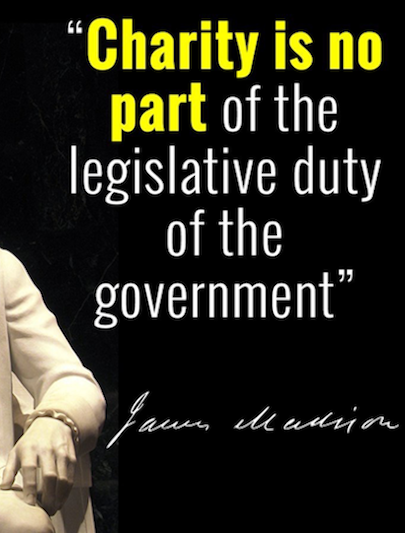 Do not bother to say good-bye. I missed a great opportunity.
Do not bother to say good-bye. I missed a great opportunity.
No, I am not blaming my friends for my own intransigence and continued existence, for I alone am responsible for my decision to remain. Moreover, I have, by no means, been denied my freedom of last resort, and am still free to exercise it whenever I wish.
Simply, it will be very difficult to find such a propitious occasion as the last. For, I have allowed myself to be swept back into the fold of unprincipled human folly and no longer stand before the noble exit of principled self-sacrifice that once prevailed. Taking my exit now would appear cowardly even unto me. Where before I could have exited as a martyr for a just cause, now I can only exit as a wimp with no backbone.
Certainly my experience this year has not been without an important lesson.
If there is courage in survival that is not foolhardy or merely primitive instinct, then it is the determination to overcome harsh times because there exists a reasonable hope that good times lie ahead. This hope cannot be the blind, minimalist hope that one entrusts in a fictional being called God, or even fate itself. For even the sun will someday fail to rise, if humanity can only survive long enough to see its own sun extinguished.
The notion that "one must continue no matter what" is a mandate of convenience. For, it avoids having to answer the very difficult question, “To be, or not to be”. Being, of course, is not doing, but many believe that just being is enough ....
Liberty - A Philosophy of Permanence
Procesos de Mercado
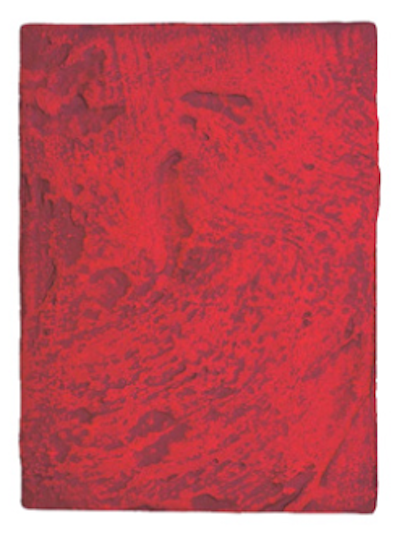 In 2015 somewhat after I posted my paper entitled “Hayek's Triangle, General Equilibrium, and Keynesian Folly : A first step in bridging the gap between the Spanish-Austrian school and mathematical formalism” on the Social Sciences Open Access Repository (SSOAR), I sent a copy of my paper to Procesos de Mercado and asked, if they knew anyone who might be interested in helping me to develop my paper into a dynamic model. As I had already published with Procesos de Mercado and had once corresponded directly with its chief editor and creator, Jesús Huerta de Soto, I was hopeful that I would receive a suggestion.
In 2015 somewhat after I posted my paper entitled “Hayek's Triangle, General Equilibrium, and Keynesian Folly : A first step in bridging the gap between the Spanish-Austrian school and mathematical formalism” on the Social Sciences Open Access Repository (SSOAR), I sent a copy of my paper to Procesos de Mercado and asked, if they knew anyone who might be interested in helping me to develop my paper into a dynamic model. As I had already published with Procesos de Mercado and had once corresponded directly with its chief editor and creator, Jesús Huerta de Soto, I was hopeful that I would receive a suggestion.
As I am somewhat familiar with European academia and know well that one must sometimes wait many weeks, even months before receiving a response to one’s correspondence, I was not surprised when nothing happened forthwith. By the middle of 2016 it was clear that my financial situation had become critical, and I was contemplating my step into oblivion. It is for this reason that I was both comforted and amused when I received an email from Miguel Alfonso asking me to reformat the document into a Word file. Apparently my request for possible co-authors had been interpreted as a solicitation for paper submission. The paper was submitted in early July 2016, just prior to my decision to go on a hunger strike. I will likely know soon, if my paper was accepted, as the next publication of the journal is scheduled for January 2017. Will I begin the new year with a very pleasant greeting or learn that my effort was in vain. I remain optimistic.
Hillsdale College
 I would like to put in a good word for Hillsdale College before I close, because the College has filled in many historical gaps about what America is supposed to be, how it got to where it is, and why it is that we must change course.
I would like to put in a good word for Hillsdale College before I close, because the College has filled in many historical gaps about what America is supposed to be, how it got to where it is, and why it is that we must change course.
I certainly do not agree in every aspect with what is being taught by Hillsdale, and would encourage those who listen to the College's online lectures to explore other sources on the nature of political and economic liberty. It would also behoove the College to investigate more deeply and broadly the meaning of the state and the nature of empire. The Hillsdale treatment of Alexander Hamilton, Abraham Lincoln, and Winston Churchill is far too laudatory, for words and behavior often do not match among those active in the political arena, as words are often used to disguise true intentions and cover over ignominious acts.
All said and done, however, what is taught at Hillsdale College, located in southeastern Michigan, is surely a clear cut above what is taught at most schools around the nation today.
Grammar Captive
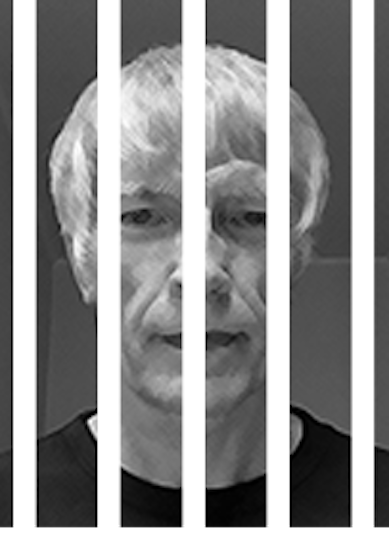 Although Grammar Captive pretty much speaks for itself, there are certain things that I can tell about here that I would not tell on the Grammar Captive website.
Although Grammar Captive pretty much speaks for itself, there are certain things that I can tell about here that I would not tell on the Grammar Captive website.
Firstly, whereas Grammar Captive was to become the long term, third leg of nudge.online, it has become the immediate primary and only leg of my work at Hing Hay Coworks. What brought about this change is: one, my proven ability to survive my current, dual, life-style; two, my strong desire to succeed with, and good confidence in, the ultimate success of Grammar Captive; and three my negative experience with building mobile applications based on other people’s platforms.
I have simply stopped applying for work, as I view it as a huge waste of time and effort. Not only are my chances of finding employment slight, but any employment that I could find would only delay the implementation of my long term retirement strategy.
My biggest disappointment with Grammar Captive so far has been the failure of my former Saudi students to organize private webinars with their friends and classmates. Individually, these students are willing to spend time with me online in private lessons, but none of them are willing or able to pay what is required to make my own online participation profitable. My offer of free webinar participation in exchange for organizing a webinar of four paying students plus themselves has simply failed.
This does not mean that my students are unwilling to help, or will not participate in future webinars. For, my request for help in translating my mail insert to promote the webinar series in Arabic met with great success. Within just a few days I had a full translation that everyone viewed as being of very good quality. Thanks, Osama!
Indeed, my single biggest challenge of the New Year will be to organize my webinars in such a way that paying students can be found. For the moment GC (Grammar Captive) Tutor is what is keeping me afloat.
Looking Forward
January 4th in the Year 2017
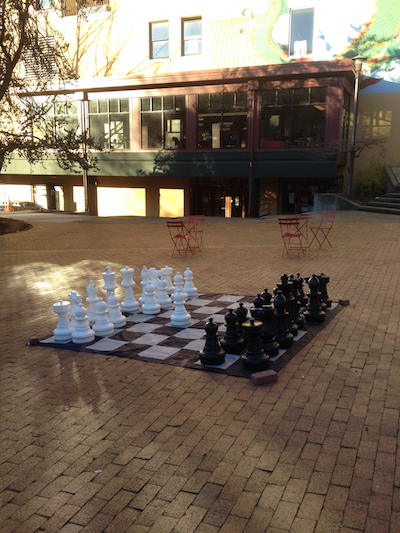 I close 2016 with far more pessimism about the future of America than what I had when the year began -- and this, with very good reason. For, never have I have been so personally disappointed by American society at large.
I close 2016 with far more pessimism about the future of America than what I had when the year began -- and this, with very good reason. For, never have I have been so personally disappointed by American society at large.
Francis Fukuyama, the author of The End of History and the Last Man once wrote that a man can only be satisfied when society views him in the same way that he views himself. Certainly in this regard experience has taught me that he is correct. Indeed, it was for this reason that I was prepared to end my own life with pride, and it is for this reason that I now continue my struggle forward with same.
There are many who would have me relinquish my ambition, join the herd, and allow myself to be led around by those who believe to know better. No, I do not know it all, but experience and reflection have shown me that those who are leading us know far less.
What our leaders have that I do not are material means and contacts in high places. I do not begrudge them either, for I have done little to develop these. More readily, I have rejected their game. Instead, I have invested my time and energy in knowledge, experience, and my physical well-being, and now is the time for me to capitalize on my investment.
America's enemy is itself, and it is both large and omnipresent and should be feared. Certainly I have little respect for it that I would not accord any other nation. What America once was, and what it is today are very different things. The mantra of freedom that it chants is an opiate of self-delusion and a tool of willful corruption. One could feel sorry for America, if only it did not create such havoc in the world for others.
I do not pretend to know America's fate, but one can well know that its citizens should be preparing themselves for some very important shocks. Indeed, I know of no empire that has disappeared without leaving a disaster in its wake. Certainly, I will do everything in my power to dismantle the American empire in a manner that brings about the least amount of havoc and defends the right of the individual to his property, person, and community.
Liberty, Peace, and Prosperity in 2017!
Roddy
credits: I would like to give special thanks this year to my good friends Professor Doktor Peter P. Baron, Robin Koerner, Eduardo Cordova, David and Sandra Evans, Sadykh Sadykhov, Jon Prosiv, Amin Beladi, Osama Al Shehri, Michael Quinn, Michael Lloyd, Sugano Yoshihiko (Michael), Porfirio Andara, the management and staff of the Bread of Life Mission, and last, but by no means least, Hing Hay Coworks -- especially Eliza. Special mention should also be given to the staff at Lunarpages who have patiently helped to move Grammar Captive forward. There are others too, such as Vicky, Patrick, Joné Ropa, Faisal Tonsi, Tony Zachary, Ahmet al Attas, and many of my dormmates at the Mission who have helped in smaller ways.
further attribution: That I not appear ungrateful to any whose names or organizations I have not mentioned!

Close Window
Roddy A. Stegemann
(1949 - Present)
A photo taken in front of the Bread of Life Mission as I stood waiting in line for the door to open.
After spending the previous night at the iHop seated before a bronze pot of coffee with a black top and bottom and a white porcelain cup with a sturdy handle to empty the twice replenished contents of the pot into my mostly empty stomach I was thankful to have found a place to spend the following night in a prone position lying on a soft bed. I would eventually be assigned to a top bunk.
Little did I know what lay ahead in the Mission.

Close Window
Eviction Notice
September 6, 2016
The eviction noticed ordered by Henry H. Judson III and posted at 6:30 AM on my door at No. 312, Paul Revere Apartments along with a warning from the King County Sheriff to remove my belongings or have them removed for me with zero assurance of their return. Fortunately, I was able to intercept the notice as it was being posted and was thus saved the embarrassment of having it seen by my neighbors.
I was not so fortunate with my request for limited dissemination, for my only means to prevent the advertisement of my eviction were denied me when the judge failed to grant reasonable allowance based on humanitarian grounds. My hunger strike was forcefully interrupted.

Close Window
Liberty Dye Works
1910
A photo taken of a photo hanging on the wall in the café adjoining the Panama Hotel.
The Liberty Dye Works were apparently founded by Japanese immigrants living in the Seattle Area. It was at a time before the Federal Reserve Act was past, the IRS was created, and America's administrative, deep state and yet to take root.
The Panama Hotel is a love hotel in Seattle's International District and a national heritage monument that chronicles Japanese internment during World War II.
Jan Johnson is the hotel's manager and caretaker -- all and all a remarkable, but capricious woman.

Close Window
DSHS Office - Capitol Hill
September 2016
Capitol Hill is the next hill after First Hill as one moves away from the water that fills Puget Sound. It is one more topographical bump of the same modern liberal establishment that has replaced the worship of a divine spiritual being with the worship of the administrative deep-state and believes thus to have enlightened all of humanity.
To the best of my knowledge the EBT Card issued by the Washington State Department of Social and Health Services is funded in part by the Federal government. It is, in effect, an arm of the same spoils system against which I had just protested as a political martyr.

Close Window
St. James Cathedral
September 2016
I know little about the St. James Cathedral and barely remember what I first saw on my first and only visit to its interior. All of my time at the Cathedral, since my decision to put my freedom of last resort on hold while I dig my way out of my current financial dilemma, has been spent in the Cathedral's annex.
It is there where I meet my newly found friend, Michael Quinn, once a week, and we talk about a variety of different matters including life at the Mission and my progress with Grammar Captive.
He, too, feels an alien in his own society, and we share a natural affinity in this regard.

Close Window
Joné Ropa
December 24, 2016
The photograph was taken at the Mission just prior to Joné's departure for Arizona where he hopes to receive a license for driving large trailer trucks cross-country. Joné is a former Fiji Islander who came to the United States several years ago in search of employment.
He claims to be the son of a millionaire and to have lived at the Mission for many years. What is more, he shared the same dormroom with the very person who sought to involve me in a racial dispute on my first day at the Mission. Unlike his roommate, however, Joné is a devout Christian in both word and deed. He stood out at the Mission as kind, devout, and good-natured.

Close Window
On Stage in the Mission Chapel
Fall 2016
The people who speak and perform on stage are just as motley, as we the residents, and the average age is little different. Nearly all of them come to the Mission to tell us how their Christian faith has changed their lives, and how it could change ours, if only we would believe as they do.
Their interpretation of the Bible and the historical context in which it was written is sometimes so at odds with my own knowledge of the text and period that I want to speak out, but hesitate when I realize that my disagreement with what they are saying lies far deeper. As I do not wish to be accused of blasphemy and ingratitude, I remain silent.

Close Window
Punishment of Religious Heretics
16th Century Europe
No, I will not be burned at the stake, but I do not wish to break my vow and spend the night on somebody else's doorstep, under a highway viaduct, or along a Seattle city side-walk. Nor, do I want to spend still another sleepless night in the iHOP across the street from Seattle University where it is permissible to speak about liberty in the cafeteria, but where it is not allowed to compete in the curriculum with socialist topics such as mainstream modern liberal economic thought.
Alas, if you want a real education, then come join me upstairs on the third floor in the dormroom after the preachers have gone and Hillary's supporters have gone to bed.

Close Window
In Front of the Mission
Late September 2016
Please do not misunderstand me, for it is not nearly as undemocratic as I have portrayed it. Indeed, on several occasions simple, humble residents, such as I, have stood on stage and led a prayer, and no one objected. Indeed, participation is encouraged, when it contributes to the message that the Mission is seeking to spread.
Yes, there is a time when you can speak your mind, but it is not in the Chapel. I quickly dismissed the guy in the picture reading from the Bible when he started to tell me what it meant to be an American. I was waiting in line for a pair of clean used socks -- still another captive audience.

Close Window
Christmas Schedule
December 2016
On Christmas morning we were awakened at 5:30 AM and had to be out of the Mission by 6:00 AM. What was one to do for and hour and a half? Nothing was open.
Unlike my fellow dormmates who could not afford a motel room on Christmas Eve, I went to Hing Hay where I have 24-hour access, seven days a week. As it is only a 10-minute walk from my office to the Mission, I returned for breakfast. There were many strangers, but few of my dormmates.
During the breakfast there were two guitarists who sang Christmas carols. They were quite talented, and I enjoyed the music. I did not stay for the presents.

Close Window
The Mission Tree
Christmas and New Years 2016
In some ways the Mission tries very hard to make a home for the homeless. Perhaps it is because the Mission is their home too. Perhaps it is because they know what it is like to be without a home, for they were once homeless themselves.
Most in the Mission know what it means to be slapped down by society, for any number of just or unjust reasons. Most at the Mission also appear to have a fairly good sense of fair play. Simply many are unable or even want to think very far into the future and appear content taking life as it comes.
Many have family. Many do not. Many are quick to take offense and simply stupid in their recalcitrance.

Close Window
Mission Mold
December 11, 2017
Coughing, like snoring, is usually the result of some unwanted obstruction. It can also be intentional and a way for one individual to assert himself over his immediate neighbors. Often the two are a combination of both natural reaction and intention.
After my first month in the Mission I noticed something in my throat and a gradual tightening in my chest. I also noticed a gradual increase in the level of coughing among my dormmates. While alone in the toilet, bath, and shower area during the wee hours of the morning I noticed a draft coming from one of the ventilators. That evening I explored a little on the internet and the linked letter to Pastor Willie was the result.

Close Window
Day Three at the Mission
September 15, 2016
After my first night at the Mission I was still able to smile (see first image in this series), for I did not have to pass a second night sitting half-awake at the iHOP across from Seattle University. Furthermore, the bed bugs, that would ravage my body on the second, third, fourth, and fifth nights, and somewhat less severely after I changed linen, cover, and beds, had yet to infest my originally assigned bed.
It would not be until the third day at the Mission that I finally had the funds to purchase a razor and hydro-cortizone to deal with the ever growing whiskers on my face and swollen welts on my skin.

Close Window
Bed Bugs or Box Cutters
To Be, or Not to Be
Blind faith is well, blind. And, the road to Hell is paved with good intentions.
I chose the bed bugs over the box cutters, because I was able to rid myself of the former, keep the latter, and discover a reasonable strategy that would make good on the blind faith of those who refused to endorse my own very sound decision to say good-bye. One delay and conversation after the other, and I allowed humanity to drag me back into its foolish fold. In the end, it was my own indecision that forced me to abandon my permanent departure. Spring board diving had taught me to commit or retreat, but never vacillate at the board's end.

Close Window
Attitude and Perspective
December 30, 2016
It was Friday night and the shining star of the Bread of Life Mission, Michael Lloyd, would be on duty. I had just turned the corner onto Main Street at the edge of Occidental Park and saw this fellow at the corner of 1st Avenue and Main Street. He was painting the Bread of Life Mission.
It is not often that someone paints your residence, and I asked him why he had chosen the Mission as the object of his painting. He replied, the lighting and the juxtaposition of the cross atop the Mission and the cross-walks on the road. His answer appeared genuine, and I asked to take a picture.
He consented.

Close Window
Attitude and Perspective
2016 and Beyond
Small businesses open and close on a regular basis -- some as part of a brand-name franchise with a proven track-record, some as the creation of their owner. The majority of small business start-ups fail. It is an important risk in time, effort, and money that the entrepreneur takes and distinguishes him from those that he eventually employs should he succeed.
I have never wanted to own my own business, but I have dabbled as an entrepreneur somewhat intensely as a free-lance language consultant in Tōkyō, a free-lance economic researcher and social activist in Hong Kong, and now as the author of Grammar Captive. Society has forced my hand.

Close Window
Amin Al Beladi
January 3, 2017
Amin's offer to help me in my time of need was well-intended, but nothing for which I wanted to set precedent. Most college students depend on the state or their own parents for their income. What is more, he was not making an investment, but saying thank you for a past for which no additional thanks were necessary.
Recently Amin sent a photo and stated that he is working 10 hours a day in his new job. I wish him well and hope that he can find better employment soon.
I am not sure that Amin truly knows the important role that he played in my decision to choose bed bugs over box-cutters. I still owe him many more hours of online lessons!

Close Window
Hing Hay Coworks
October 3, 2016 - Present
During my first several weeks at the Coworks I looked everywhere for the meaning of the name Hing Hay. After several hours of research I fell upon the two characters 慶 and 喜 as likely candidates. For, written together in Buddhist writings they symbolize resignation with one's own fate. So, I presented these to Eliza, the office manager, with the expectation that they would eventually be displayed on the Coworks' website or in the Coworks itself.
To this day I have yet to receive even a confirmation of my determination from the local Chinese community.

Close Window
Eliza Chan
October 31, 2016
Within weeks after my arrival I was beginning to get used to the encoding, decoding, and interpretation of silently placed messages throughout the office and the seemingly harmless, surreptitious investigations of semi-private spaces by unknown actors. This inspired me to reply on the most appropriate of occasions possible -- Halloween. So, I promised Eliza that I would carve a pumpkin and asked for permission to display my result. Not only was permission granted, but a carving party was organized.
This is an enlarged image of Eliza's lantern. The kind, smiling, somewhat wise and ironic face of the author is reflected in her work.

Close Window
Roddy and Monisha
October 31, 2016
Being the social rebel who understands well against what he rebels, I carved my lantern early in the morning before the others arrived and had their party.
After all the lanterns were carved, they were displayed together on the Coworks main counter where goodies are commonly placed for the purpose of sharing. It was a somewhat festive occasion as many had worn costumes.
The somewhat sourful, Zombie-looking countenance on the right is Monisha's. The more traditional lantern that captures the trick (smile), treat (eye brows), mystery (cat eyes), and holy spirit (nose) of the childrens' (teeth) holiday is mine.

Close Window
Henry
January 3, 2017
Henry is one of my fellow dormmates. I have heard both from him and others that he is a good chess player, but I have yet to play him.
He promised to buy me a coffee for Christmas, but when it came time to deliver nothing was forthcoming. He was also the only person who replied "Fuck you" and gave me the finger when I wished him, Merry Christmas!
Henry makes me laugh, and unlike me he fits well into the constant jesting of some of our more extroverted mission mates. He is also a fan of Tom Brady (a fellow hunger-striker) and the Boston Patriots.
At the Mission each has his own corner.

Close Window
King Street Station
November 2016
(Early Morning)
The King Street and Union Stations are sometimes confused as they occupy the same general area, and both are important transportation hubs.
Not since working as a greenskeeper's assistent and caddy as a teen have I had to awake and arise so consistently and early in the morning. There are few people and cars on the streets when I make my brief ten-minute journey from the Mission to Hing Hay.
I would much rather be able to view the stars, but the early morning urban lights are also of some interest.

Close Window
President Barack Obama
2016 White House Correspondents’ Dinner
I voted for President Obama in 2008, but failed to vote for either major party candidate in 2012. President Obama was not only a very real alternative to Hillary Clinton and John McCain, but he was well-spoken and of mixed racial background. America appeared to have come a long way in terms of race-relations during my 17-years absence, but it had also taken many steps backwards in terms of others. Unfortunately, like most politicians, Obama was much better with words than actions.
Things began to change in 2010 when I met a Libertarian on Facebook. I hardly viewed him as the liberated person that he claimed to be ....

Close Window
Bread of Life Mission
Mid-September 2016
We both occupied top bunks. The fellow was a notorious snorer, and I thrice asked him to please make an effort to control his snoring. On the third occasion I was told to stop waking him, as I was disturbing his sleep. Never mind that he was disturbing mine. He then threatened me with violence were I to awake him again.
I eventually went to sleep with the thought that we would be both tossed into the street by the Mission's management were he to make good on his threat, and I were forced to defend myself.
Although I have observed violence at the Mission, I have never observed it against another -- only against property.

Close Window
Columbia Center, Seattle
New Year's Eve 2016
On my way home from Hing Hay to the Mission I noticed that the colors displayed along the three rims of the Columbia Center were not changing as I had seen them change many times before while still resident on First Hill. In fact, this time they were a consistent whitish blue. The Arizona Cardinals (NFL) had just defeated the Seattle Seahawks 34 to 31 on Christmas Eve and Seattle was still morning Hillary's defeat. The building appears to be owned by a Hong Kong investment firm named Gaw Capital Partners and is managed by the Urban Renaissance Property Company LLC, a company registered (UBI 602676398) in the State of Washington.

Close Window
State of the Union (Left)
2016 Presidential Election
If this image and the one that follows were pasted back together one would notice a yellow line down the same middle road traveled by Hillary Clinton and Jeb Bush.
The idea, of course, is that few followed the middle of the road during the past election, and that the American public is politically divided far more than in the recent past. This division is both real and contrived. On the one hand, whoever is in power answers not to the people, but to those who control public opinion. On the other hand, America is finally waking up to its own divided house -- the natural result of the nation's unAmerican spoils system.

Close Window
State of the Union (Right)
2016 Presidential Election
Although the American political left and right mean different things to different people, they appear to be two different wings of the same imperial bird -- indeed, both promote and partake in the same unAmerican spoils system.
When painted with broad strokes both wings promote empire and cater to, and take advantage of, our nation's corrupt financial system and industrial-military complex. Whereas the Left promotes social over market values, the Right promotes market over social values, when in fact both sides intervene in the market place with their own values antithetical to the true meaning of political liberty.

Close Window
Young Men's Christian Association
October 2016
The atmosphere at The Y is very different from that of the 24-Hour Fitness gym in downtown Seattle. Of course, now I am engaged in all kinds of activities in which I did not engage before including squash, volleyball, and basketball in additional to my daily weight training.
Though the building in which The Y is housed is very old, it is better maintained. Maybe it is because it is not open 24 hours a day, and there is time to perform a thorough cleaning with no interference from guests who would otherwise get in the way and become an excuse for not performing one's daily tasks.

Close Window
Corner Café
Cafée d'Arte
During the first three weeks of my homeless state my coffee intake probably tripled, as coffee was the only thing of which I could have more without having to pay extra. Further, I was now spending two to three hours every morning at the same place where I had rarely spent more than an hour and usually not more than 30 minutes every day. Where before the Corner Café was a place to start my day in the presence of others, now it was a place where we tolerated each others presence, as I waited for the Seattle Public Library to open.
Although people are still amazed by my physical appearance, I am deeply concerned about my continued good health.

Close Window
Beyond Misinformation
December 25, 2015 - September 11, 2016
In 2009 I signed the A&E for 9/11 Truth's petition and donated USD 100 to their cause. On Christmas Day 2015 I presented two signed copies of Beyond Misinformation: What Science Says About the Destruction of World Trade Center Buildings 1, 2, and 7 to the Corner Café for public consumption. On the following day they were no where to be found. Everyday thereafter I displayed my own copies on my table as I drank my morning coffee and read political economy. My departure from First Hill interrupted my reading, and I was unable to finish Abbé Augustin Barruel's third volume on the French Jacobins, Free Masonry, and the Illuminati.

Close Window
Corner Café
New Year's Day 2017
It was an eery, but fitting end, and an ominous sign for the New Year. It were as if the café had suffered a fate similar to my own. I have no idea what has become of the owner and the others -- only Eduardo, who told me that he was not concerned about finding new employment and that he would be taking a month off as he rested from 8 years of consecutive employment at the same café.
I am now waiting for the Sorrento Hotel to close, for it was there where my first attempt to organize regular meetings outside of academia for the purpose of spreading the message of liberty was rejected. The Corner Café served the hotel's guests as a competitor.

Close Window
Dong Guk
Thanksgiving Day Morning 2016
Dong-Guk was my first student while at Hing Hay. Everyday for more than a month I sent him a collection of phonetic pairs to practice what he had learned during one of his six meetings with me at Hing Hay. Toward the end of November he complained that he was very busy with his seminary work and would not be able to return until December.
December came, but there was neither Dong-Guk, nor the many students that he had promised to bring with him. I texted him several times, but still no response. Michael Quinn has told me that he is still in communication with him, but not nearly as much as before.

Close Window
Porfirio Andara
November 2016
Being paid to help others improve their own lot, and then watching them improve it, is an immensely rewarding experience that encourages one to invest in one's own future.
I watched Porfirio go from a dishwasher at Nordstrom's and short-order cook at a disreputable burger joint called Johnny Rockets in downtown Seattle to a server's assistant at an upscale Italian restaurant located in the West Lake Mall.
By helping Porfirio I was able to make my own ends meet and nearly finished the year within my own means and those received from the donors to the Bread of Life Mission.

Close Window
Karl E. Stegemann
March 7, 2011
The last time that I saw my little brother was in 2005. I do not remember clearly whether the flowers that I threw on my mother's casket landed on her heart or head, but I suspect on her heart. Karl followed by throwing his on the opposite spot.
Every year since 2007, what I have labeled The Longest Year of My Life, I have written about the events of the past year that have made it memorable. It is my gift to my family, friends, and the world, for I write very little of fiction.
Members of my deceased older brother's family have since opened the door that was closed to me by my niece in the face of crisis. Do I bother to knock again without an invitation?

Close Window
James Madison
1751 - 1836
With the exception of Robin Koerner, the Blue Republican, not a single person -- with or without prominence in the liberty movement -- reached out to help me in my time of sacrifice and need. Even those to whom I had given substantial financial support in their own political campaigns to advance the movement were silent. Not even a retweet from those who knew me! No, America, liberty will not be achieved without solidarity, and solidarity cannot be achieved without compassion.
It is no wonder that so many accuse Libertarians of being philosophical and void of substance, for what is a mind without a heart, but sophistry of the human intellect.

Close Window
Procesos de Mercado
Thanksgiving Day Morning 2016
Procesos de Mercado is a european journal of political economy that provides the intellectual rigor necessary for sound scientific investigation of the dynamic processes of social cooperation characterized by the market place. The journal places special emphasis on the role of the entrepreneur and the various economic, juridical, and moral institutions that make human society possible.
Procesos de Mercado is the home of my first publication in economics from an Austrian perspective. In 2016 I submitted my paper "Hayek's Triangle, General Equilibrium, and Keynesian Folly" to the journal for publication.

Close Window
Hillsdale College, Michigan
1844-Present
"Though established by Freewill Baptists, Hillsdale has been officially non-denominational since its inception. It was the first American college to prohibit in its charter any discrimination based on race, religion, or sex, and became an early force for the abolition of slavery. It was also the second college in the nation to grant four-year liberal arts degrees to women." Surely, it is difficult not to become trapped in the rhetoric of the victor, especially when the college touts such a close relationship with the founding of the radical Republican Party. The college's praise for Lincoln and American empire, and its entertainment of modern liberal social issues are my only misgivings.

Close Window
Grammar Captive
2016 and Beyond
It is not always clear to me who is the captive of Grammar Captive -- my potential audience or myself. Then too, the idea of Grammar Captive was not born in a virtual void, but arose out of many years of experience in the field of second language education and a very real societal present. Thus, it is not surprising that I can relate equally well to both the captive and the freeman depicted on my newly founded enterprise's landing page.
It is my hope to free both the captive of grammar and the societal freeman from their respective linguistic and societal captivity. Yes, Grammar Captive, in the end, is about freedom.

Close Window
Hing Hay Courtyard
January 4, 2017
The Year 2017 will probably be the most challenging year of my life. Fortunately I have never been better prepared.
Already white has taken its first move and is waiting for black to take its.
The world is a chessboard for those in government and in the corporate boardrooms across America. Never have I taken a bigger step than I took last year. Never have I fallen so hard.
That those be wary who would strike me down again. I may appear little, but in a world of chaos, only those whose mind and heart are one will succeed.

Close Window
